
The newspaper of the Independent Education Union of Australia NSW/ACT Branch (vol 45 #7) November 2025
PP 100000871 ISSN No: 0728-4845



The newspaper of the Independent Education Union of Australia NSW/ACT Branch (vol 45 #7) November 2025
PP 100000871 ISSN No: 0728-4845

More than 1500 preschool teachers, parents, children and supporters rallied in Sydney, Lismore and Coffs Harbour on 15 October as part of the Start Strong, Pay Fair campaign, calling for long overdue pay rises for preschool teachers.
Members heeded the union’s call to shut community preschools for at least half a day to attend the rallies.
Dressed in bright pink, they called on the NSW government to provide funding to boost the pay and conditions of teachers and educators in community preschools who are paid up to 30 per cent less than their counterparts in schools.
The IEU called the Day of Action after the NSW government rejected the union’s proposal for more funding for wage rises in the sector despite more than 12 months of bargaining in the Fair Work Commission (FWC).
The IEU’s preschool ambassadors – Melinda Gambley, Margaret Gleeson, Janene Rox, Jodie Cox, Bridget Isichei and Raelee Smith – have worked tirelessly to represent the interests of colleagues in early childhood education and care at the FWC as part of the supported bargaining process.
But the NSW government sought to withdraw from the bargaining process in July and has refused to increase funding to community preschools to address the systemic and growing workforce crisis.
Community preschools under threat Sydney’s Martin Place was a sea of pink as speakers lined up to highlight the workforce crisis that threatens the viability of community preschools because of inadequate pay.
Speakers also criticised the state government’s refusal to take responsibility as the main funding body for community preschools in NSW.
The rally was covered extensively in the media – on radio, evening TV news bulletins and newspapers such as The Daily Telegraph. NSW Liberal leader Mark Speakman issued a media release in support of the campaign for better pay and conditions.
Clunes Community Preschool director Melinda Gambley was featured on 7News telling the rally in Martin Place: “We cannot keep our quality programs if we cannot keep our skilled and expert workforce.
“We cannot attract new people to the preschool sector on the current wages and funding,” she said.
Carol Matthews Secretary

31 October. As Newsmonth went to press, the union had been advised that the provisional voting result for the Catholic Systemic Schools EA was a 98% yes vote. This vote is tallied across all nine dioceses. In the Parramatta Diocese, 99% voted in favour of the
Continued on page 3


Newsmonth is published eight times a year (two issues per term) by the Independent Education Union of Australia NSW/ACT Branch.
Executive editor Carol Matthews, Secretary, for and on behalf of the IEU Executive and members
Managing editor Monica Crouch
Contributors Katie Camarena
Monica Crouch
Andrew Taylor
Tania Yardley
Photos Katie Camarena
Zoe Hercus
Graphic design Chris Ruddle
Proofreader Helen O’Regan
Letters from members are welcome. They do not reflect endorsement if printed, and may be edited for size and style at the editor's discretion. Write to:
Newsmonth
485-501 Wattle Street
Ultimo NSW 2007
GPO Box 116
Sydney NSW 2001
Tel: 8202 8900
Email: ieu@ieu.asn.au
Website: ieu.asn.au

As my term as President concludes, I reflect with pride on a year defined by resilience, solidarity and achievement. Together we have strengthened our collective voice, defended the rights of members and built fairer workplaces.
Change and the role of the IEU
Education is constantly in flux – teachers and support staff continually adapt to new expectations while true reform remains slow. This gap between change and action places strain on schools and staff.
In this context, the IEU’s role is vital. With a second-term federal Labor government, we have a real opportunity to secure lasting improvements in conditions, resources and support for educators.
Membership growth
A key focus this year has been implementing the IEU’s strategic plan –Stride to Grow 2030 – which prioritises growing the number of members.
Membership growth is not simply a number – it is the foundation of our strength and bargaining power.
Achieving wins for members
Demonstrating the value of union membership remains essential.
Recovered entitlements, in particular, provide a clear and compelling example of the benefits of membership. In 2025, the IEU recouped $4.4 million in underpayments for members.
This outstanding result is a testament to the skill and commitment of our team and a reminder of the direct benefits of IEU membership.
ECEC gains A major victory this year was the hard-fought win for early childhood education and care (ECEC) staff employed in long day care centres.
After years of advocacy, members achieved a 10% backdated pay rise, with a further 5% increase in December – proof of what unity and persistence can achieve.
Standing up for justice
As I conclude my time as President, I do so with immense gratitude for the trust and solidarity of members.
The strength of the IEU lies not in any individual, but in our collective commitment to fairness, respect and justice. The IEU must continue to be a vocal, relevant force on human rights issues.
When educators stand up for justice, they not only protect their profession - they model courage, compassion and integrity for the next generation. In doing so, we create not just better schools, but a better world.

Negotiations for three new enterprise agreements (EAs) for principals in NSW and the ACT are progressing steadily.
The union is also monitoring matters outside the EAs that affect principals’ wellbeing, responsibilities and professional standing. Meetings with directors from 10 dioceses have provided valuable insight into these broader issues.
The EAs under negotiation are:
NSW & ACT Catholic Systemic Schools
Principals Enterprise Agreement 2025 Catholic Schools Parramatta Diocese Ltd –Principals’ Enterprise Agreement 2025 Principals (Archdiocese of Sydney) Enterprise Agreement 2025.
The Broken Bay agreement expires at the end of December, and negotiations are expected to begin shortly.
Pay rises
After their July 2025 increase, Broken Bay principals were 5.3% ahead in salary.
Under the three new EAs, covering a threeyear term, principals will receive a 3% annual salary increase – maintaining alignment with teachers and support staff.
A one-off Cost of Living Allowance (COLA) may also be triggered if inflation exceeds 4.5%. These changes will narrow the salary gap with
Broken Bay, though disparities remain – 2.4% at the lower end and just over 3% at the top.
Leave provisions
There are big improvements to parental leave. Superannuation will be paid during parental leave. In addition, if the initial primary caregiver (often the birth parent) returns to work or study within the first two years, the non-initial primary caregiver may access up to 12 weeks’ paid leave.
While we welcome these changes, they also create added management responsibilities at the school level.
A proposal to reduce the notice period for principals from 10 weeks to four – aligning with teachers – was rejected, with the seniority and complexity of principal roles cited.
For workers compensation, the current maximum weekly payment of $2546 falls short of principal salaries. The union argued for access to personal leave to supplement income during compensation periods. While dioceses declined to include this in the EA, they indicated willingness to issue an undertaking
Long service leave and student vacation periods are still points of contention, with the Bathurst diocese under particular scrutiny for compliance.
Child protection
Child protection protocols continue to evolve. Principals will retain access to redacted hard copies of confidential files following preliminary findings in allegations. However,

Last term, a teacher from another school disclosed to me that, after two decades in the role, they were planning to step down from their subject coordinator position.
To say I was shocked is an understatement. Sitting across from me was a dedicated, passionate and talented teacher and leader.
That they felt they couldn’t do the job anymore highlights that we have a long way to go in addressing workloads. It is vital that we make all roles sustainable and attractive for dedicated and talented teachers.
I asked that teacher to tell their story:
One coordinator’s story
“Twenty years ago, with my youngest child starting school, I was ready to go back to full-time work. I had been a science coordinator previously, but I wanted to join the Catholic school system so started back as a classroom teacher.
“Surprisingly, I quickly realised that I missed coordinating so much: developing new staff; being able to alert the executive about staff who were in need and improving key learning areas (KLA) processes. In the new year, the coordinator position at my school came up and I got it.
“Now, 20 years on, in that same school that I love, I’ve decided that this year will be my last as a middle leader. I still love the classroom – more than ever – but the demands of middle leadership have become too great.
“No longer do I feel that I can be an advocate for my staff as it seems like more and more administration is being directed my way. It leads me
debate with the Office of the Children’s Guardian over document ownership remains unresolved. Until legislative clarity is achieved, current protections will stay in place.
Other updates include an increase in the travel allowance to $0.84 per kilometre, with the previous 100-kilometre cap removed.
A new health and wellbeing clause encourages principals to take at least one 30-minute meal break daily. While challenging in practice, this marks an important step toward improved workplace health and safety.
Issues to be resolved
Concerns remain about classification equity for teaching principals in small primary schools with fewer than 100 students.
The union has also sought a 20 per cent casual loading for acting principals. Practices differ across dioceses – most appoint internally on higher duties, while Sydney Catholic Schools relies more heavily on casuals. We are seeking clarification of pay rates for principals seconded to larger schools.
It has been confirmed that once a principal completes their initial Foundation contract, their accreditation at the Accomplished level will be maintained for ongoing employment, regardless of school size.
We anticipate the final draft EAs will be ready in Term 4, with voting planned for mid-to-late November. We will then convene an online meeting for principal members in Catholic systemic schools to review the agreements and discuss their implications.
to ask the question: My own children are grown, I know the job, so if I can’t keep up, who can?
“I do not blame the school; it is simply addressing the myriad legislation and expectations that are a part of the education sector. But with teaching staff struggling to keep up with heavy workloads, and leadership being more complex than ever, KLA leaders have become the school’s workhorses. They are putting in place – at the nuts and bolts level – all the new and changing initiatives that are a constant part of this profession.
“I recall the fable of the frog in boiling water. If you place a frog in boiling water, it will jump straight out. But if you put it in water that is room temperature and gradually heat it to boiling, the frog won’t notice and slowly be cooked to death. Middle leaders have become the frogs in water and each new piece of administration turns up the heat.
“I, for one, am no longer willing to get burnt.”
What the union’s doing
To help prevent excessive and poorly implemented initiatives that are burning out teachers, the IEU is part of the National Teacher Workforce Action Plan Working Group, working with the federal Department of Education on the draft Teacher Workload Impact Assessment tool.
Several IEU recommendations have been incorporated into this tool. (Find out more in Change Without the Churn: bit.ly/changewithoutchurn)
We need to collectively raise workload concerns when and where they are occurring, and seek solutions at the local level.
We are not serving our students, colleagues or profession if we cannot attract or retain quality leaders in our system.
NSW and ACT general employees
These increases will match those applying to support staff in NSW government schools. The increases are:
4% from the first full pay period on or after 1 July 2024 (already paid by all dioceses)
3% from the first full pay period on or after 1 July 2025 (will be back paid to July in the next pay period, if not already paid)
• 3% from the first full pay period on or after 1 July 2026.
The pay increase for general employees, expected to apply from July 2027, will be negotiated in that year.
Cost-of-living adjustment
If the annual inflation rate exceeds 4.5% in 2026, there is provision for the parties to discuss a possible one-off lump sum payment in 2026. This will only be paid if the NSW Department of Education makes such a cost-of-living payment to its employees.
Improved conditions
Parental leave
There is now greater flexibility to take parental leave for the non-initial primary caregiver. If this employee becomes the primary caregiver after the initial caregiver has returned to work or study, then a period of up to 12 weeks paid parental leave may be taken.
In the case of babies born or adopted after the commencement date of the EA, such leave may be taken in the period up to two years from the date of birth or adoption (the current period is limited to 12 months).
The commencement date of the EA is seven days after the EA is approved by the Fair Work Commission, likely to be in December. The new flexibility will apply to babies born or adopted from then.
Payment of superannuation on parental leave paid by your
Final Report from the Anti-Bullying Rapid Review
employer will also apply from the commencement date.
Ceremonial leave
Employees identifying as Aboriginal or Torres Strat Islander will be able to take up to three days leave each year for cultural and ceremonial purposes.
Teacher workload
Excessive workloads are still a major challenge for teachers.
The union meets regularly with employers and government representatives to seek improvements.
For example, we have insisted that new teaching and learning proposals must always be assessed for their workload impact and whether the proposal replaces existing work or simply adds to it: see bit.ly/changewithoutchurn
We have also sought to limit the extent to which employers, in the name of compliance, impose their own requirements far in excess of what the government requires.
Following consultation with the union, state and federal governments have released Fact Sheets clarifying what is required – and what is not required. Examples include the NCCD Evidence Requirements Fact Sheet; the NESA Curriculum – Programming and Record-Keeping Fact Sheet; and the AITSL Australian Teacher Performance and Development Framework.
Your IEU organiser will be happy to support you in addressing excessive workload at your school. A collective school-by-school approach can achieve real improvements.
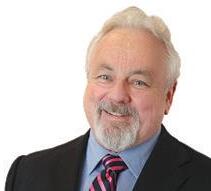
The federal government in October released the final report from the Anti-Bullying Rapid Review.
Education ministers agreed on a national plan as part of the review, which was set up to examine current school procedures and best practice methods to address bullying behaviours.
The IEU played a significant role in the review, lodging a detailed submission and consulting directly with the review’s co-chairs Dr Charlotte Keating and Professor Jo Robinson.
Ongoing consultation vital
The submission confirmed the union’s support for reform but emphasised the importance of ongoing consultation and adequate resourcing to reduce bullying in schools.
Teachers and school leaders must have adequate release time to manage complex behavioural issues, including time to implement and enforce new anti-bullying policies or approaches.
The submission also said workload impact assessments should be applied to new anti-bullying procedures. Undertaken with staff and their union, these assessments would identify obstacles to the implementation of new approaches and confirm the additional time or resources needed by school staff to offset workload impacts.
The submission also noted the serious health and safety impact that bullying, physical violence, sexual harassment and emotional abuse has on school staff.
Special exemptions for faith-based schools to discriminate against staff and students must be modernised to reflect community expectations and send a clear message that discrimination is wrong and damaging in all contexts (see page 6).
While progress has been made, substantial details remain to be developed and clarified to implement the review’s recommendations.
One recommendation requires schools to make a “reasonable
effort” to initiate safety and support planning – along with appropriate communication – within two school days of becoming aware of bullying or other harmful behaviours. This timeframe acknowledges that additional time may be necessary to fully resolve complex issues. Naturally, stakeholders will seek clarity around what constitutes a “reasonable effort” and which behaviours fall under the category of “other harmful behaviours”. These definitions will be critical to ensuring consistency and accountability across school communities.
Union welcomes funding
There is broad support for the initiative’s goals. The union welcomes the federal Labor government’s decision to spend $10 million on a national awareness campaign and new resources for teachers, students and parents as part of the national plan to combat bullying in schools.
The social media ban for under-16s will also come into effect in December. The federal government hopes it will reduce online bullying. The success of a national framework depends on genuine, ongoing consultation with teachers and school leaders who will bear the burden of implementation. To that end the IEU will be advocating for: training to be provided during release time for all education staff applying a whole-of-school approach to prevent and address bullying and other harmful behaviours
• ensuring strong and visible school leadership to drive culture change enhancing transparency on anti-bullying actions implementing evidence-based approaches, and supporting the school workforce to prevent and address bullying.
Bullying is a societal problem and, of course, schools have a vital role in protecting students from its often-devastating impacts. But schools cannot be expected to do this on their own.
Responsibility needs to be shared – parents, the community, employers, education authorities and schools all have a role to play. Only through genuine collaboration and unwavering support for those working directly with students can we ensure that schools are safe and welcoming learning environments for everyone.

Bargaining is in full swing for two new multienterprise agreements (MEAs) covering teachers and support staff in Catholic Independent Model A schools.
We are expecting a swift bargaining process as the IEU meets weekly with Catholic Employment Relations (CER) – and we are aiming to finalise the MEAs before the end of the year.
The union has advanced a comprehensive set of claims aimed at securing improved pay, leave entitlements and working conditions.
We have seen considerable progress through the bargaining, and member engagement is the key to successful bargaining outcomes.
Key claims
In this round of bargaining, the union seeks to build on improvements achieved in the last round. In addition to annual pay increases, we are advocating for:
superannuation to be payable on paid parental leave paid Cultural and Ceremonial Leave • up to 12 weeks of paid parental leave for noninitial primary carers.
Claims for teachers
We’re actively exploring whether the teacher classification structure should be changed to bring Model A schools in line with other education sectors that have already embraced a seven-step classification model.
Similar to independent schools, we are also pushing to introduce a workload transparency clause requiring schools to advise their teachers of the workload expectations at the school.
The advice from the school would normally include face-to-face teaching hours, any extracurricular activities and release time for middle leadership roles.
Support staff
CER has agreed to union claims to broaden the coverage of the MEAs to include counsellors and school psychologists. We are working to ensure counsellors and psychologists are properly classified and covered under the proposed MEA, thus protecting their entitlements.
Stronger together
As bargaining progresses over the next few weeks, the union calls for member involvement to achieve meaningful change. Update your colleagues on progress and invite non-members to join the union.
With key issues still on the table, member engagement is critical to drive the bargaining forward and bring about positive change. Union membership matters.

From a teenage retail assistant in suburban Adelaide to Federal Employment and Workplace Relations Minister, Amanda Rishworth knows unions are vital for protecting the rights of working people.
At the IEU National Officer Forum held in Sydney in August, Rishworth described how she sought her union’s assistance after she was handed a “take it or leave it” individual contract by her employer and later sacked.
“We went to what was the old state-based Industrial Relations Commission,” she said. “The Commissioner looked at both parties and said, ‘Give this poor girl her job back’.”
Importance of unions
Rishworth said the episode showed that laws made in Canberra can have a real impact on people’s lives “even as a 19-year-old working their first casual job”.
She said it also showed the important role of unions: “We need healthy, strong unions in this country to make sure the workplace
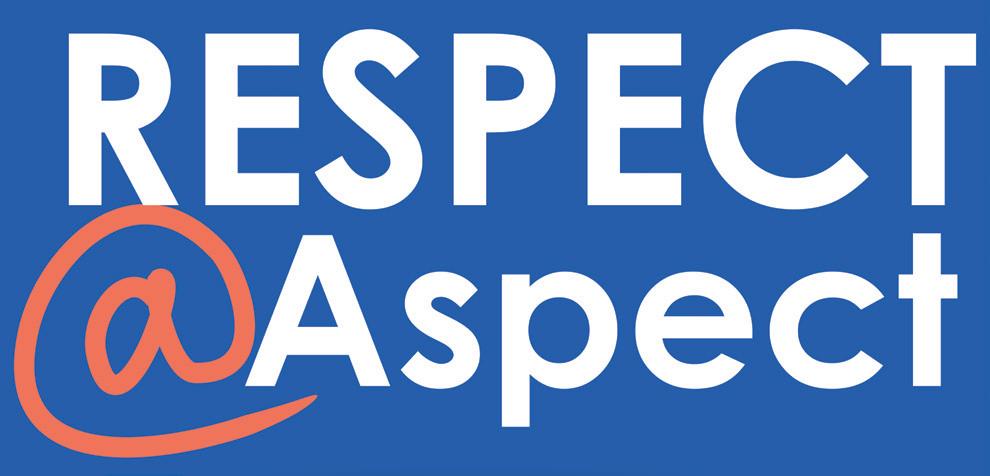

Rishworth acknowledged the role of unions in electing and re-electing the Albanese government and backing the raft of new industrial laws the IEU has used “to make a difference for your membership”.
She said crucial policy initiatives making a fundamental impact on people’s lives include:
10 days’ paid family and domestic violence leave strengthening paid parental leave and flexible work banning pay secrecy clauses.
Closing the gender pay gap
“Of course, closing the gender pay gap has been at the core of what we’ve wanted to do as a government, and I know it’s the core of what you want to do as a union,” Rishworth said.
She said the narrowing of the gender pay gap since the election of the Albanese government was a positive sign.
“But of course there is more to do,” she said. “We want to see that gender pay gap really at zero.”
Rishworth said the supported bargaining process the Albanese
IEUA Federal Secretary Brad Hayes, Federal Employment and Workplace Relations Minister Amanda Rishworth and IEUA Assistant Federal Secretary Veronica Yewdall.
government has introduced was also critical in addressing the gender pay gap.
“I don’t think there’s any better illustration than in December 2024 when we saw the Full Bench of the Fair Work Commission approve the first multi-employer supported bargaining agreement across the early education [long day care] sector,” she said.
Rishworth acknowledged the role of the IEU and other unions in the agreement, which achieved 15% pay rises for more than 45,000 staff in the sector over two years.
Other wins
Rishworth also discussed the federal government’s success in reinvigorating enterprise bargaining, boosting pay and job security, and implementing the right-to-disconnect laws, which the union advocated for strongly.
“Just because you can be contacted by a parent late at night, your clear message was it shouldn’t mean you should have to automatically respond,” she said.
The union is campaigning for fair pay and better conditions for teacher aides in Aspect schools.
Aspect (Autism Spectrum Australia) is a large autism-specific services provider.
It operates schools across NSW and the ACT as well as employing teacher aides – known as Learning Support Assistants (LSAs) – to work in satellite classes in government and non-government schools.
Big pay disparity
LSAs undertake rewarding but challenging work. Under the Association of Independent Schools Professional and Operational Staff Multi-Enterprise Agreement (MEA), Aspect LSAs are paid up to 19% less than their counterparts employed in government and Catholic systemic schools.
This discrepancy is heightened by the fact that many LSAs are based in these schools.
IEUA NSW/ACT Branch Secretary Carol Matthews in September outlined the union’s concerns about this pay disparity in a letter to Aspect’s chief executive.
Aspect LSAs are about $10,000 a year worse off than their counterparts in Catholic systemic and government schools, Matthews said.

“This is particularly concerning considering Aspect teacher aides work in environments which are more demanding and require greater skill,” she said.
“This pay disparity is causing real distress to our members.”
Financial documents lodged with the Australian Charities and Not-for-profits Commission show Aspect recorded a surplus of $28 million in 2024 – and received $130 million in revenue from taxpayers.
Matthews said the union had “significant concerns” about the application of the higher duties allowance and reported use of teacher aides for the delivery of curriculum rather than supervision of Aspect classes.
Work health and safety
Matthews noted that Aspect schools and satellite classes often include students who can become dysregulated and potentially violent.
“Aspect teacher aides take pride in supporting these students in their education. However, as workers, they are entitled to feel safe in the workplace,” she said.
“We hold concerns about the burden of reporting incidents and the resulting possibility that this could be causing systemic underreporting.”
Matthews also noted that in some cases, teacher aides are not provided with paid time to write incident reports and are therefore required to complete these in their own time.
“We call on Aspect to rectify this issue by ensuring that teacher aides are provided with additional paid time where it is required to complete incident reports,” she said.
The union has met with the employer and said it should pay teacher aides more. The MEA is a minimum rate of pay and employers can agree to pay above it.
“We want teacher aides to get a pay rise that reflects what they deserve,” Matthews said. “We understand how complex their work is.”
Membership means strength
Strong union membership means the union has greater bargaining power.
This is why the union is urging staff in Aspect schools to join.
“It all starts with a solid membership base,” Matthews said.
“We are seeking to effect change via a strong grassroots campaign. We urge everyone to join the union and get active.”
Join the IEU: bit.ly/ieujoinnow
Policy decisions affecting the teaching profession are still being made by people who have never been teachers.
That was one of the key observations made by IEU member Catherine Nolan about the National Teacher Workforce Roundtable in Canberra on 19 September.
“Non-teachers make decisions which they think are helpful for schools and they are only adding to the workload of teachers,” she said.
Nolan, a teacher at Canberra Girls Grammar School, was one of four IEU members who attended the meeting alongside IEUA Federal Secretary Brad Hayes.
Convened by Federal Education Minister Jason Clare, the roundtable aimed to address priorities for the teaching workforce and progress of the 2022 National Teacher Workforce Action Plan.
Voice of teachers vital
Hayes said the voices of classroom practitioners are central to policy discussions about teacher attraction and retention.
“Workload and teacher burnout, staff wellbeing, teacher autonomy, respect for the profession and financial security are among issues the IEU raises on behalf of members,” he said.
Hayes said the federal government had improved consultation mechanisms in the past three years, helping to restore teacher voices in key education policy debates.
“These positive developments must be maintained and expanded to ensure that teachers continue to have meaningful input into decisions that shape their profession,” he said.
Despite the lack of teachers in the room, Nolan said the roundtable was “incredibly useful”.
Nolan, who has been a teacher for more than three decades, shared her experiences of dealing with burdensome workloads.
Nolan said she would like the federal government to implement a national register for teachers and streamline national teaching standards.
Unsustainable workloads
IEU member Jacinta Lai, a teacher at Orana Steiner School in the Canberra suburb of Weston, also attended the roundtable.
Lai said the voices of school leaders and teachers were vital to ensuring the challenges faced by the teaching profession were effectively addressed.
The issues I am most concerned about are unsustainable teacher workloads, psychosocial harm, safety and burnout,” she said.
“Many of my colleagues who are highly skilled and experienced
The IEU is fighting for members who have had up to 10 days of long service leave unfairly deducted by Catholic Education Diocese of Bathurst (CEDB).
The dispute centres on the correct interpretation of clauses 37.5(f) and (g) of the current enterprise agreement (EA) relating to long service leave.
The issue is whether non-term time adjacent to a period of long service leave is counted as part of the long service leave taken.
A number of teachers who took short periods of long service leave adjacent to the pupil vacation period (PVP) in July 2025 had additional days of long service leave deducted by CEDB.
The union accepts this is permissible under the EA. However, members fear the rule was applied in an arbitrary and unfair way.
While Bathurst is currently the only diocese to impose this harsh interpretation on teachers, the IEU is concerned other dioceses may follow suit.
The IEU is seeking a reversal of the decision arguing that: the decision to deduct PVP as long service leave should have been made at the time the teacher applied for leave clear criteria for the deduction must be available before leave applications are made.
Affected teachers had applied for their long service leave with six-to-nine months’ notice (and had approval from their principal and CEDB). But they were only advised of CEDB’s decision to deduct additional long service leave a few days prior to commencing their leave.
The IEU has asked the employer to clarify the criteria used to determine who was subject to the deduction, but the employer has not yet responded.
The union is concerned at the inference the clause was only imposed on teachers who were overseas or interstate – and therefore could not be recalled to school during non-term time.
Members have signed a petition calling for the long service leave to be recredited and for greater clarity on the application of the long service leave clause.
The IEU has sought a formal response from CEDB and applied to the Fair Work Commission seeking to recredit the leave that was deducted from IEU members. As Newsmonth went to press, we were awaiting formal listing of this matter.
Donna Widdison Organiser

teachers have left the profession or are moving to part-time due to burnout and poor mental health.”
A lack of mentoring and induction for early career teachers was also discussed at the roundtable.
“We need to provide more time and possibly remuneration to experienced teachers for mentoring,” Lai said.
“Effective mentoring is essential to support early career teachers to develop into well-connected, healthy, confident and effective teachers who do not burn out within five years.”
Excessive administrative tasks to produce NCCD evidence, program documentation and reports on student progress were also topics of discussion.
Lai said teachers are spending considerable unpaid time on
weekends and in the evenings to complete work.
“This has detrimental effects on family relationships, mental health and work-life balance,” she said. “We need a collaborative, team-based approach to manage workloads.”
Lai said more consultation with unions and teaching professionals was imperative if reforms and initiatives were going to be effective.
She said the negative narrative around teaching needed to change and teacher expertise valued in decision-making.
Investing in inclusive education for smaller class sizes, highquality resources and training and sufficient support staff in class to provide safer learning environments were also crucial, she said.
The IEU is in formal discussions with the Diocese of Lismore Catholic Schools (DLCS – the employer) after members on the NSW mid north coast raised concerns about staffing reviews and uncertainty about their jobs.
Members in schools in the Port Macquarie, Coffs Harbour and Kempsey regions in September contacted organisers about potential full-time equivalent (FTE) reductions, larger class sizes, impacts on workload and job security.
The IEU responded to members’ concerns by seeking clarification from the employer and reminding them of the obligation to consult under the enterprise agreement.
Members in schools that may be impacted also responded quickly, convening meetings at short notice and passing motions expressing concern, calling for clearer information and consultation, and reassurance for staff.
The union’s actions and correspondence led to formal discussions between the IEU and the employer, with a meeting held in October between IEUA NSW/ACT Branch Secretary Carol Matthews and the DLCS Director of Catholic Schools.
The employer advises that no major restructure or systemwide staffing cuts are planned for 2026, although the employer acknowledges staffing changes will occur in some schools.

As school-specific information comes to light, organisers will continue to liaise and work with members in those schools.
The employer confirmed it is finalising its 2026 budgets and funding allocations and will provide further clarification once that process is complete. Importantly, the employer has committed to consulting with the union on major changes in the future.
The IEU has emphasised the need for transparent communication with staff and early, genuine consultation with the union on changes that may affect employment, workload or wellbeing.
Members have shown solidarity during this challenging and uncertain time. This has demonstrated the power of their collective voice to ensure that any change takes place with us –not to us.
Discussions between the IEU and the employer are continuing in a constructive spirit – communication has improved, and the union will keep members informed as further details emerge.
Around the Globe brings you international news about injustices and workers’ rights. If injustice exists anywhere, it exists everywhere.
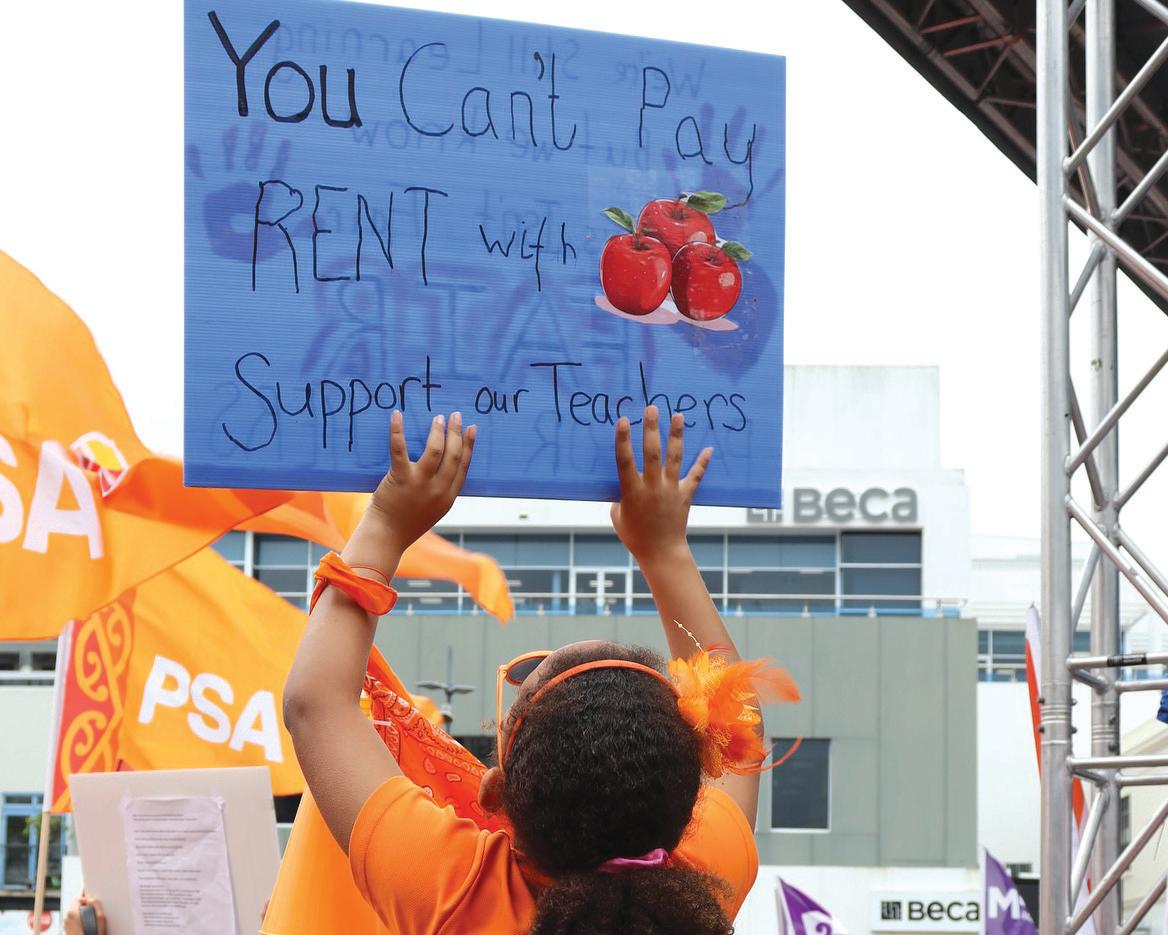
job in New Zealand on 23 October. It was the largest labour action since 300,000 workers took part in the 1979 General Strike.
Members from the Post Primary Teachers Association (PPTA Te Wehengarua), New Zealand Education Institute Te Riu Roa (NZEI), Public Service Association (PSA), the New Zealand Nurses Organisation (NZNO), and the Association of Salaried Medical Specialists (ASMS) voted to strike after collective bargaining with the coalition government all but stalled.
The PPTA said offers were not meeting the rising cost of living and teachers were seeking better pay.
“PPTA has received a couple of offers from the government for settlement of the secondary teachers’ settlement, but both fail to meet the needs of secondary teachers and students,” PPTA President Chris Abercrombie said.
Some teachers are moving overseas, with many looking to relocate to Australia. PPTA members have been holding rolling strike action since mid-October and planned another nationwide strike on 5 November.
Palestine: Rebuilding education
In early October, representatives from Education International (EI), the global federation of education unions, travelled to Palestine to stand in solidarity with members of the General Union of Palestinian Teachers (GUPT) on World Teachers’ Day. EI has long advocated for the rights of educators working in conflict zones.
“The hardships they endure working with such dignity and
commitment under occupation are a lesson for us all,” EI General Secretary David Edwards said.
“I wanted to honour them and those we have lost in Gaza, but no words suffice for such a massive failure of humanity.”
Despite the widespread destruction and loss, teachers are still committed to the education of students. In solidarity with their communities, Palestinian teachers have been working on just 50% of their salaries for over 14 months.
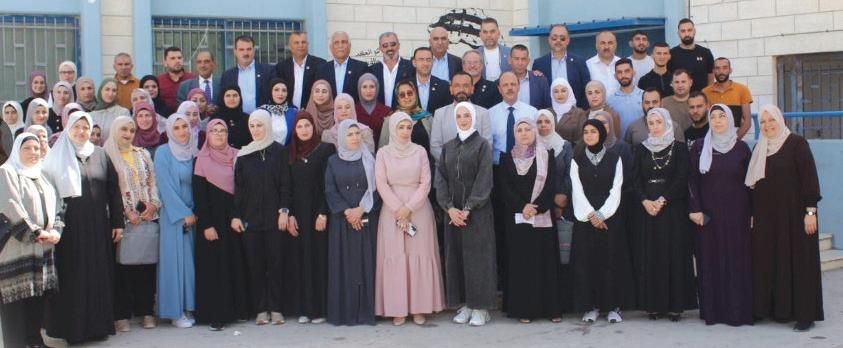
With more than 95% of education infrastructure destroyed in Gaza, about 1000 teachers killed and a generation of children lost, this year’s theme, “Together for Teachers, Together for Tomorrow”, carried special meaning for teachers in Palestine.
Hopes for a ceasefire, lasting peace, and the rebuilding of education are finally beginning to take shape.
Taiwan: Schools akin to sweatshops
In Taiwan, teachers have marked World Teachers’ Day with a protest outside the Ministry of Education.
The National Teachers Association (NTA) is calling on the government to improve working conditions and listen to teachers. In a press conference, the NTA said: “Only by improving working conditions can we attract talented people to work in education.”
A recent union survey of over 11,000 teachers revealed that 97% felt the current incident-management system unfairly treats them as suspects in a criminal-style complaint process, undermining trust between teachers, students and parents.
Teachers also reported being pressed into tasks far beyond teaching while racking up considerable overtime due to staffing shortages as well as juggling excessive administrative loads.
Drawing on the results of the survey, the NTA said: “Teachers have nearly become forced labour in sweatshops called schools.”
Beyond these specific concerns, the survey results flagged urgent systemic reforms: 89.2% believe the Ministry of Education should more decisively support teachers and defend the profession; over 86% called for higher pay and fewer administrative duties; and nearly 80% pushed for smaller class sizes and increased school security.
The NTA stressed that the teaching profession is becoming less attractive to young graduates because of unsatisfactory wage and pension systems, and without urgent change, Taiwan faces a growing teacher-shortage crisis.
The IEU will introduce a new membership fee structure for teachers in the post-secondary education sector in 2026. There will be a standard “Post-Secondary Teacher” rate for all teachers in the sector, with the long-standing “Sessional/ Extended Casual” rate abolished.
Union membership
For most existing members, this will mean a small reduction in union fees. Only a small fraction of teacher members come under the old Sessional rate, and those teachers will be gifted three months free membership in 2026 to ease the transition to the new rates. Our membership team will contact these members with more details.
There will also be an option for part-time teachers to join via a discounted fee, with those teachers working for three or fewer days a week eligible to access this new part-time rate.
Our membership team has also been working on new membership joining material that will more accurately reflect the post-secondary sector.
Officers from the union will be conducting regular visits to colleges throughout 2026. If you would like us to visit your college, contact the union: 8202 8900.
Agreements update
Your union has been very active in the enterprise bargaining space in 2026. Here’s a round-up of negotiations.
UOW College
The union reached a settlement providing for pay increases of 3% in 2025 (backdated to January), and 2.75% in each of 2026 and 2027. There is also an inflation trigger for these latter years, allowing for the annual increase to go as high as 3.5% if inflation passes a set level.
Taylors College
Negotiations have been protracted and somewhat difficult, as management kept pushing for trade-offs that members did not wish to give. But members’ resolve seems to have paid off as the parties are close to finalising a new three-year deal, with pay rises of 3% a year.
Navitas Skilled Futures
A settlement has been help up following delays in new contracts from the federal government, but it is hoped that an agreement can be reached in the coming months. Pay rises are likely to fall in the 2-3% a year range.
WSU The College
Negotiations are at an early stage and not likely to be concluded this year.
The Fair Work Act contains provisions for “good faith bargaining”, which means an employer must bargain where a majority of employees (or group of employees, such as teachers) want that to happen.
Workers employed under enterprise agreements always receive pay and conditions that are better than the award.
Contact your union to find out how this might work at your college.
Kendall Warren Organiser
The union strongly believes every person in NSW should be free from discrimination, vilification and prejudice in their workplace.
This is the key message of the IEU’s submission to the NSW Law Reform Commission, which released a consultation paper earlier this year as part of a review of the state’s AntiDiscrimination Act
Out-of-step with community values
IEUA NSW/ACT Branch Secretary Carol Matthews said the review offered a critical opportunity to modernise the Act, which is almost 50 years old.
“The Act permits broad exceptions for religious bodies and private educational authorities, enabling discriminatory practices that are increasingly misaligned with contemporary community standards and human rights principles,” she said.
The union believes these exceptions undermine the Act’s primary purpose of promoting equality and preventing discrimination in public life.
“IEU members have not fully benefited from the protections provided under the Act due to the breadth of these exemptions and exceptions,” Matthews said.
Matthews in May said discrimination is unwelcome in schools and would be unlawful in every other industry.
“Schools of faith can continue to thrive without the need to discriminate,” she said. “School employers have nothing to fear from modern community standards.”
Discrimination a psychosocial hazard
Matthews said special exemptions to discriminate are in conflict with the responsibility of employers to mitigate psychosocial hazards in the workplace.
“Discrimination at work can have a devastating impact on the mental health of workers,” she said. “Teachers and support staff in faith-based schools deserve the same employment protections as the rest of the community.”
The union’s submission to the review also called for the introduction of new protected attributes such as religious belief and industrial activity.
Introducing such protected attributes would be a positive step towards improving the Act’s effectiveness in keeping up with contemporary and evolving community standards.
“These reforms are needed to uphold the dignity and rights of all individuals and foster inclusive workplaces,” Matthews said.
“More importantly, they are needed to ensure that antidiscrimination law in NSW reflects the values of our diverse, multicultural and democratic society.”
Devastating impact of discrimination
One of the early cases dealt with by the IEU (formerly the NSW Independent Teachers Association) involved a member, Haysell Tennant, who was a primary school teacher employed at St Aloysius’ College in Kirribilli. Despite more than a decade of exemplary service at St Aloysius’ and 25 years teaching in Catholic schools, Haysell was dismissed from her employment.
Although no reasons were specified in her letter of termination, it was apparent that St Aloysius’ decision was driven by its awareness of Haysell’s sexual orientation and lifestyle, which was inconsistent with the religious belief of the Catholic Order that operated the College.
The union successfully secured a reinstatement for this member because of the failure of the employer to give reasons for termination.
After her reinstatement, the College directed Haysell to perform her role away from the classroom and have minimal or no contact with students and parents.
Haysell felt marginalised from the school community and tragically, several months later, she took her own life.
“Haysell’s case is just one of the many profound examples of the devastating consequences of discriminatory conduct permitted by the exceptions for religious bodies under the AntiDiscrimination Act,” Matthews said.
“The issue of exceptions for private educational authorities and religious organisations in NSW anti-discrimination law remains a current and pressing concern.”
As the school year winds down, you may be thinking about moving on. Maybe you have a new career opportunity, maybe you’re slowing down, or maybe you’re planning a sea or city or tree change?
As a school or preschool employee, if you are considering resigning from your current position, there are some things you need to be aware of before you say adios!
What you must do
First and foremost, you must find out what conditions apply to submitting your notice of resignation.
The first condition will be how many weeks’ notice is required. Notice periods can range from one to seven weeks. There are also different conditions depending on whether you are a teacher or a general employee.
For teachers:
a minimum of four-to-seven term weeks’ notice is required depending on the enterprise agreement (EA) that applies to your employment, or at least seven term weeks’ is required if your employment is not covered by an EA and therefore the Educational Service (Teachers) Award 2020 applies.
Further conditions could apply depending on the EA covering your employment. For example:
the whole notice period will need to be within a term for some, the last day of work should not fall in the last two weeks of a term
• if you cannot give the full number of weeks’ notice, then your employer can request that the shortfall be deducted from money that is due to you (usually the amount that can be deducted is subjected to a limit).
Most resignations are submitted at the end of a school year. As many non-government schools have a different finishing date, teachers need to be very clear as to when the last working day is before submitting their resignation.
For general employees, the rules are a bit different: the notice period can range from one to four weeks depending on how long you have worked with the employer the notice does not have to be in term time.
General employees may also be asked to agree to a deduction if the notice period is not met.
What you should do
After submitting your resignation, you should seek clarification about whether it will impact your end-of-year leave entitlements.
For most school and preschool employees, pay is based on the notion of not working during pupil vacation periods. This means that over summer, up to four weeks of your pay will be your annual leave entitlement. Whether you are paid a full four weeks will depend on how many term weeks you worked during the year.
When resigning, payment during the following January may also depend on your school’s service date.
For most schools, the school service date is the first day of Term 1. So if you work a full four terms, you will generally be entitled to be paid up to Australia Day the following year.
However, a small number of schools have a school service date of 1 January. In these schools, staff, especially teachers, are generally only paid up to 31 December.
A resignation before the end of Term 4 or any unpaid leave taken during the year will have an impact on the calculations of your end-of-year entitlements.
Once you have made the decision and submitted your resignation, you should ask about:
when you will be paid and details of any outstanding leave entitlements
obtaining a Statement of Service on school letterhead processes for the return of school property, with particular focus on handing back school devices such as laptops and management of personal data.
If you are staying within Catholic schools but changing employers, check your long service leave provisions – rather than having your leave paid out, it may be portable and you can take your accrual with you.
What you could do
If you’re going to a new school employer, we recommend you check out the employment conditions before you sign on the dotted line. Not all EAs are the same.
This applies to all employees – teachers and general employees alike. Different EAs have different pay structures and requirements for progression to higher levels.
Different schools have distinctly different expectations about workload. Members can access EAs for different schools by logging in to the IEU website.
If you’re considering a change for the 2026 school year, we recommend you contact your IEU organiser to discuss your plans and any questions related specifically to your personal circumstances.
Forewarned is forearmed.
Donna Widdison Organiser

Following an extended bargaining process, the IEU has finalised the two new multienterprise agreements (MEAs) for teachers and general staff employed in Christian schools in NSW represented by Christian Schools Australia (CSA).
These MEAs, which have a nominal expiry date of 31 March 2027, include substantial improvements to pay, paid parental leave entitlements and other rights.
Pay rises
Over the MEAs three-year duration, teachers will receive a cumulative increase of 17.5% and general staff will receive 15%. The MEAs deliver pay increases as follows:
Employees in preschool and childcare services received an initial pay increase of up to 5% in February 2024 to ensure their rates remained competitive.
Shorter teacher classification structure
Effective from 1 July 2026, a streamlined sevenstep classification structure will be introduced for teachers.
This change aligns CSA schools with other sectors, including NSW government, Catholic systemic and independent schools.
The revised structure enables teachers to reach the highest pay step sooner, acknowledging their professional expertise and commitment.
Expanded coverage for general staff
The new MEA for general staff will now cover school psychologists. While the overall classification structure remains unchanged, a new classification has been added to accommodate this category of general staff.
The newly introduced rates for school psychologists are competitive against NSW government schools.
Better new parent bonus
The new parent bonus, which supplements the federal government’s paid parental leave scheme, will be progressively increased to:
• 22 weeks from 1 July 2024
• 24 weeks from 1 July 2025
• 26 weeks from 1 July 2026.
Additionally, the MEAs provide up to two weeks of paid paternity leave for fathers, which may be taken at the time of birth or adoption placement, or within 12 months thereafter.
The IEU aims to achieve further improvements to paid paternity leave as a focus area for future bargaining.
Other improvements achieved include: broadening eligibility criteria to request flexible work arrangements
• strengthening casual conversion rights
• a new clause outlining union delegate rights, including access to training and workplace facilities
• introduction of a right to disconnect clause.
The achievements secured in these MEAs are a direct result of the ongoing commitment and engagement of IEU members throughout the bargaining process.
Union membership is vital in securing fairer pay, stronger rights, and improved working conditions.
Amanda Hioe Assistant Secretary
Teachers and general employees employed by Indie Education across Australia have achieved improved pay and conditions after a vote in favour of a new enterprise agreement (EA). Indie Education operates schools and colleges providing alternative education for young people throughout Australia.
Bargaining commenced in early 2025 and, as the employee bargaining representative, we advanced members’ claims for better pay and working conditions.
Pay rises and new classification structure
The new EA guarantees salary increases of 2.5% each year over four years. Due to the simplification of the classification structure, employees other than teachers will receive a range of increases from a minimum of 2.5% up to 23.5%. This restructure means clearer career pathways and stronger pay outcomes.
Teachers
Teacher classifications will move to just three levels with a new level for those who achieve Highly Accomplished or Lead Teacher accreditation. This change delivers pay increases between 2.5% and 27.2%, with most teachers receiving at least 10.8%.
Work hours
The new EA sets a consistent 37.5-hour work week for all employees, including teachers, across all schools operated by Indie Education.
Nationally consistent school year and public holidays
Indie Education is introducing a nationally aligned school calendar with consistent term breaks and public holidays across all schools. Through IEU pressure, Indie agreed to provide maximum notice to employees so those who have caring responsibilities have adequate time to make arrangements.
While the final EA does not capture every claim we pushed for, it represents meaningful progress and lays the groundwork for future bargaining. Outcomes in bargaining are closely aligned with the strength of our membership. We can only achieve wins where we have strong membership so we can build on these gains in future bargaining.
Amanda Hioe Assistant Secretary

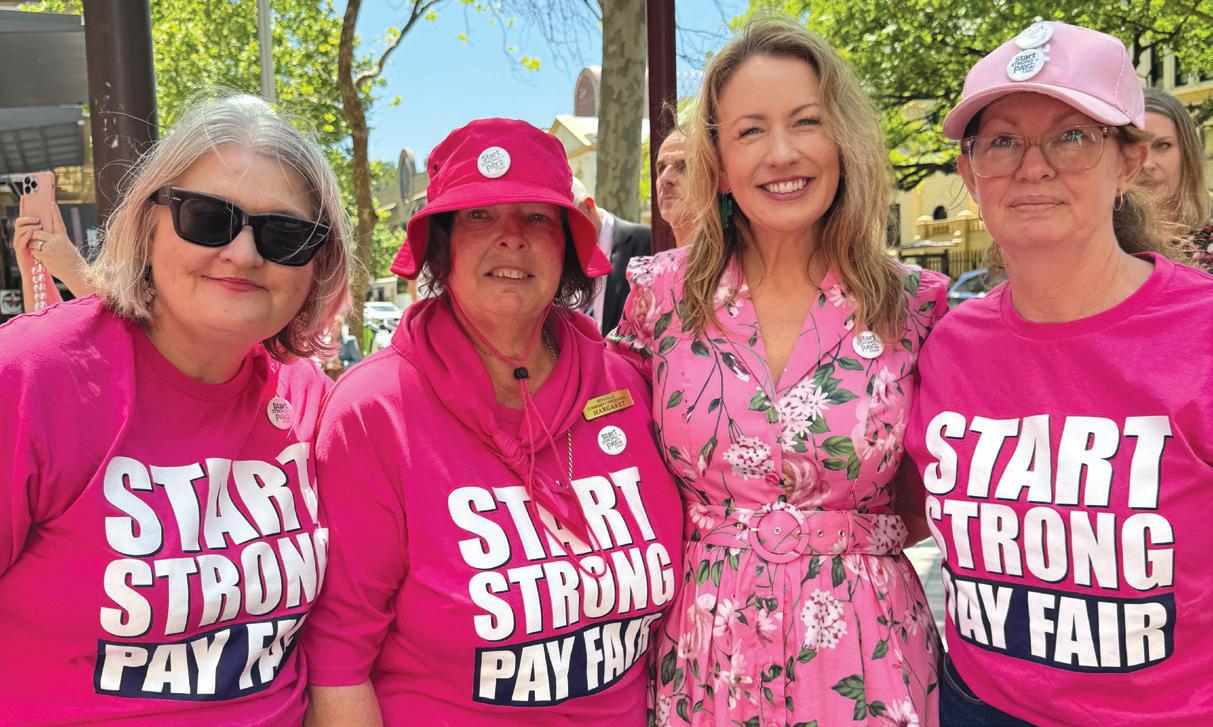
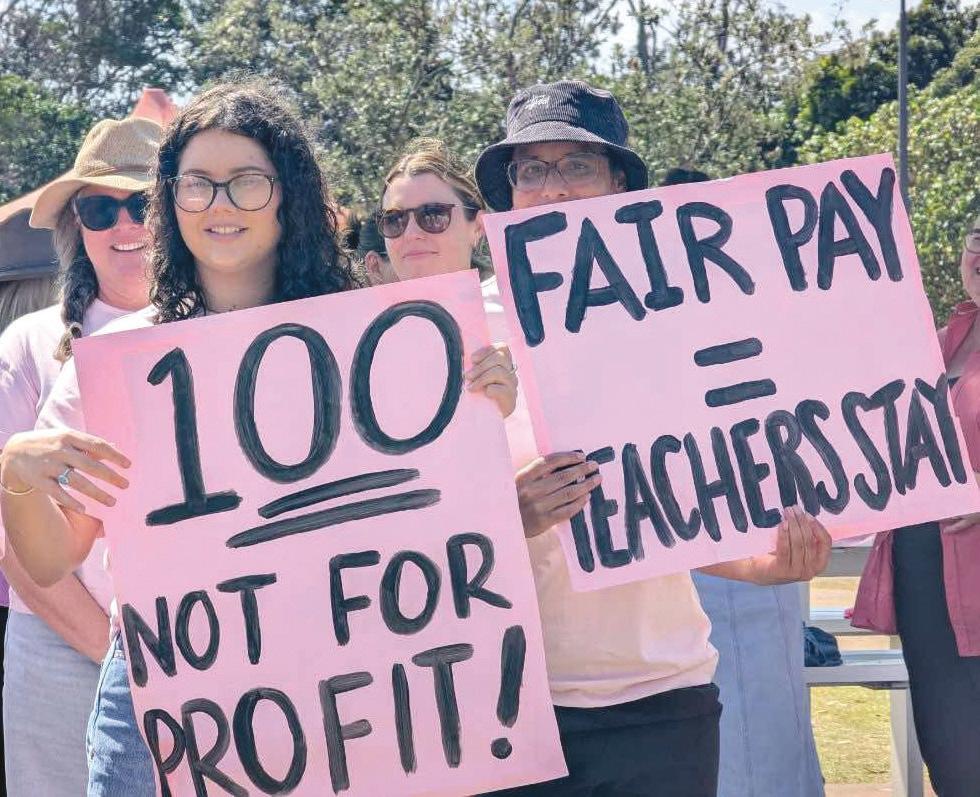



Cronulla Preschool director Janene Rox said staff in community preschools were paid “far less than they deserve”.
“They are underpaid, undervalued and overworked,” she said.
Rox also told the rally that one-in-five educators are planning to leave the sector in the next 12 months. This will only exacerbate the workforce crisis.
“Let’s be clear – it is not just about wages,” she said. “It’s about value. It’s about respect, and it’s about giving community preschools the support they need to open their doors, retain their amazing educators and provide consistent quality care to families right across NSW.”
Unsustainable workloads
IEUA NSW/ACT Branch Secretary Carol Matthews told the rally that current rates of pay for teachers and educators in community preschools were not sustainable.
Matthews also criticised the NSW government’s proposed $100 million scheme for converting preschools into long day care services.
“Let’s spend money on the core issue, which is proper pay and conditions for teachers and educators in preschools,” she said.
After the rally, Matthews was interviewed by ABC Sydney Afternoons presenter Kathryn Robinson about why union members had closed their services to attend rallies in Sydney, Lismore and Coffs Harbour.
Matthews said preschool staff faced unsustainable workloads, including mounting paperwork that mostly had to be completed outside work hours.
“There’s been real problems in attracting and retaining staff,” she said. “There are problems filling vacancies now. There’s a real concern this will get worse.”
A number of politicians also attended the Day of Action, including Upper House Greens MP Abigail Boyd, who told the Martin Place rally that teachers and educators in community preschools deserve too be paid fairly.
Boyd said she was “truly honoured to stand alongside hundreds of community preschool teachers and advocates outside Parliament today and support your demands”.
“Thank you to each and every person who showed up today –including the many teachers who rallied across the state in your local communities,” Boyd said.
The importance of community preschools in rural and regional areas was demonstrated by the attendance of several Nationals politicians at the rally, including Shadow Minister for Education and Early Learning Sarah Mitchell.
“I think it’s pretty desperate and a bit of a cop out from the government to try to pretend that [community preschools] are flush with cash and don’t need this support,” Mitchell told The Daily Telegraph.
“These are not-for-profit, community-run services. Largely, the committees that are in charge of them are local community people and parents, and they invest every dollar that they have back into the quality of those services.
The union has long called on employers to provide greater clarity and consistency around face-to-face teaching hours and extracurricular obligations.
This is because transparency is a crucial step towards fairer and more sustainable workloads for members.
Workload transparency was a key win of the IEU’s ‘Now’s The Time’ campaign in Term 4 of 2024 to secure better pay and conditions for teachers and support staff in independent schools.
In a major breakthrough, the Association of Independent Schools (AIS) agreed to the union’s demand to include, for the first time, a workload transparency clause in the new Teachers Multienterprise Agreement (MEA).
Under clause 16.5, employers must now inform teachers on appointment and from time-to-time of the following: the usual number of face-to-face teaching hours per week or per cycle for a full-time teacher the general requirements in relation to extra-curricular activities any reduction in face-to-face teaching hours for teachers in leadership 1 and 2 positions.
This clause imposes obligations that employers must follow.
Yet members are reporting that schools are not readily complying and are often unwilling to provide information in an easily accessible or transparent way.
IEU organisers are actively seeking to enforce the clause across 250 schools, including at sites where membership is low.
But there is still much work to be done in terms of securing transparent work arrangements for teachers in AIS MEA schools.
We urge our members to contact the union through your organiser if your employer is not complying with the workload transparency clause.
The union has produced resources to empower chapters to require employers to comply including a pro forma letter to formally request this information from school leaders.
Members fought hard for the inclusion of the workload transparency in the Teachers MEA and it will be a major focus of IEU organisers’ work in independent schools in 2026.
For more information and a flyer to share with colleagues: ieu.asn.au/ais-workloads



The union is shocked by the ABC Four Corners investigation ‘Hunting Ground’, broadcast on 27 October, reporting on paedophiles preying upon young children in Australia’s early childhood education and care (ECEC) sector.
“We are deeply disturbed by the revelations in Four Corners and share the anger of parents whose children have been harmed by criminals who have infiltrated a sector in crisis because of the failings of some forprofit childcare centres,” said IEUA NSW/ACT Branch Secretary Carol Matthews.
“Children should never be the victims of cost-cutting by private equity and other for-profit players to boost profits and shareholder returns.”
quality education and care is behind the crimes and serious safety breaches uncovered by Four Corners,” Matthews said.
“Cost-cutting, high staff turnover and gaming of child-to-staff ratios are leading to inadequate supervision of young children, which risks their safety.”


The IEU stands with our members in calling for the best possible education and care for young children, which lays the vital foundations for their development and lifelong learning. This starts with attracting and retaining highly qualified teachers and educators who are paid fairly.
Workforce crisis
The Four Corners investigation reveals predators are committing crimes in early childhood settings because of lax regulation, inadequate oversight and a lack of trained staff.
“The sector needs reform – the focus on profits rather than high-
Matthews was interviewed by ABC Radio Newcastle following Four Corners about the importance of adequate staffing to ensure the safety of children in early childhood settings.
“It has to be the case that services cannot operate where there is one staff member alone with a child, and they cannot be seen from any other part of the service,” she said.
The union welcomes measures to rebuild confidence in the sector by establishing a strong child safety culture. But the NSW and federal governments must also fix the workforce crisis caused by low pay and excessive workloads that lead to staff burnout and an exodus from the sector.
The union has repeatedly raised issues that impact the early childhood sector, such as ongoing teacher shortages leading to inadequate staffing ratios. Compulsory child safety training for centre operators as well as staff is essential.
“The wellbeing of children should never be sacrificed for the sake of profit,” Matthews said.
Child safety practices that apply in schools must also be adopted in the early education and outside school hours care (OSHC) sectors.
That was the message of IEUA NSW/ACT Branch Secretary Carol Matthews at NSW Parliament on 13 August.
“Our members are appalled by media reports of abuse and mistreatment of young children, mainly in for-profit centres,” she said. “It is clear the sector needs urgent changes to rebuild a strong child safety culture.”
Matthews was giving evidence to a NSW parliamentary inquiry into early childhood education and care (ECEC), alongside IEU organiser Lisa James, and IEU member and Cronulla Preschool director Janene Rox.
The inquiry, chaired by Upper House Greens MP Abigail Boyd, was prompted by revelations of mistreatment and abuse of young children in centres mainly operated by for-profit providers.
In March, an ABC Four Corners investigation revealed a rising number of breaches and safety concerns in mainly forprofit services.
This has been followed by a spate of allegations of child abuse at other ECEC and OSHC services around Australia.
Pay parity with school teachers
Matthews told the inquiry that better pay and conditions are key to improving the quality of services and solving the sector’s staffing crisis.
“We don’t think it’s a matter of quick fixes – for example, we don’t support banning male educators,” she said. “We’re not really confident that putting CCTV in services is the solution.”
Matthews also spoke about the need for reforms to rebuild a child safe culture in the sector in television interviews on 7News and 10 News as well as ABC Radio, 2GB and Triple M.
Matthews told Seven’s National News at Noon host Natarsha Belling that many of the child safety issues in long day care were in for-profit services.
Matthews said there was a lack of knowledge among some providers about their legal obligations as well as a lack of training in child protection.
“It’s really hard to balance profit with [the] interests of children,” she said.
Matthews also emphasised the importance of adequate pay and conditions to address the ongoing staffing crisis in the sector.
“There are staff shortages, unfilled vacancies, rapid turnover of staff,” she said.
“Now that’s not conducive to a safe learning environment for young children.”
“Perfect storm”
An IEU member since 2016, Janene told the NSW parliamentary inquiry the sector was “strained to the point of breaking”.
“We have just seen so many dedicated educators and teachers leave the profession because they feel undervalued, unsafe and exhausted,” Janene said.
IEU organiser Lisa James told the inquiry the safety of children must be prioritised over profit.
“Providers making millions of dollars in profits for shareholders is in direct conflict with quality – because quality costs money,” she said.
The IEU’s submission to the inquiry called for a greater emphasis on developmental and educational outcomes and less focus on data collection and “documenting everything that happens throughout the day”.
“Teachers and educators are leaving the sector at unprecedented rates due to burnout and dissatisfaction,” Matthews told The Daily Telegraph

IEU speaks: The IEU has a federal union that represents, advocates for and acts on behalf of all 75,000 IEU members throughout Australia in matters of education policy, industrial relations and workplace laws.
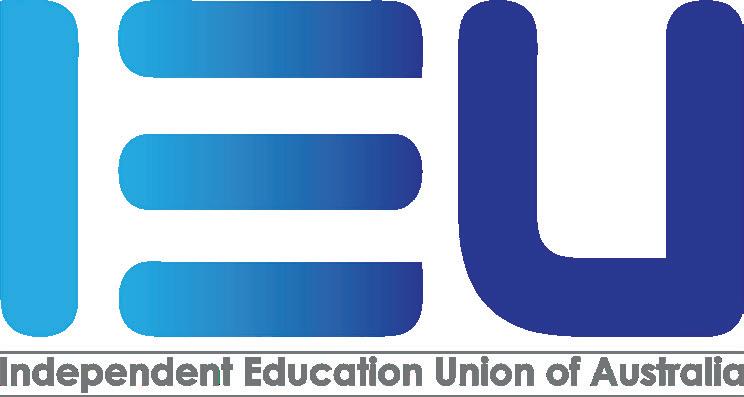
IEU Federal Council delegates from across Australia met in September to develop a bold reform agenda to deliver safer, fairer and more equitable schools and workplaces.
The IEU Federal Council is the governing body of our national union, made up of delegates from each of the IEU state and territory Branches as well as elected federal officials.
At the 2025 Federal Council meeting held in Sydney, delegates set the direction of our union across a number of key priority areas. These positions will guide our campaigns to win the changes needed at both federal and state levels: countering gendered violence in schools: the growing threat of tech-based abuse
universal access to paid reproductive health leave • updating and modernising anti-discrimination exemptions for faith-based schools addressing the impact of education policies and reforms on teacher workload.
These initiatives, alongside collective bargaining campaigns, and advocacy for further industrial reforms to end punitive employer lockouts, underpin the work of our union nationally and locally.
The federal Labor government is to be commended for the education and workplace reforms delivered over the past three years – these positive gains must continue and now move into the next phase of union wins.
New protections against gendered violence, and the removal of outdated discrimination exemptions for faith-based schools, will help build safer and more respectful school communities.
Universal access to paid reproductive health leave will provide vital support for school staff managing serious health conditions, helping to retain experienced teachers in classrooms.
And a full roll-out of the Teacher Workload Impact Assessment Tool is critical to guard against the relentless growth of administrative paperwork and excessive compliance imposed on teachers.
Real action is needed – from governments and, most importantly, school employers – if we are to rebuild a sustainable, high-quality education workforce.
The IEU calls for stronger action on artificial intelligence (AI) in schools and teacher workload as the Productivity Commission’s interim report falls short in key areas.
The IEU made a detailed submission to the Productivity Commission’s interim report Building a Skilled and Adaptable Workforce
While the report acknowledges the profound impact of AI in schools and the systemic problem of teacher workloads, a comprehensive plan is needed to guarantee worker protections and reduce workloads.
The report contains eight draft recommendations covering aspects of schools and education, post-secondary skills and qualifications, and occupational entry requirements.
Drawing on member feedback and real-world experience of teachers and school leaders, the IEU submission focuses on the two recommendations dealing with schools and student outcomes.
Access to centralised lesson planning materials for teachers Previous attempts to provide “off the shelf” teaching resources have often failed due to their rigidity and the simplified nature of generic materials.
Any new centralised lesson planning materials must be adaptable to the full spectrum of classroom needs and diverse student cohorts.
Their use must remain subject to teacher autonomy and professional judgement in the classroom.
Employers carry the ultimate responsibility for addressing unsustainable workloads.
Centralised teaching resources must be matched with
concrete employer action to reduce excessive demands on teachers and school leaders including the provision of adequate release time.
Equitable access to education technology and AI
The interim report highlights the rapid emergence of education technology and AI in schools.
While these tools have the potential to support teaching and student learning, there are countless dangers that need to be mitigated to ensure the safe and ethical roll-out of AI for students and staff.
The proposed use of AI to reduce teacher administration tasks must be based on programs proven in practice, developed in consultation with the profession and evaluated through Teacher Workload Impact Assessments.
The IEU is also calling for AI implementation agreements between employers and staff to safeguard job security, data protection, privacy and skills development.
The union shares the ACTU’s concerns with the report’s broader sections on skills, qualifications and occupational entry requirements.
The report fails to prioritise meaningful solutions to Australia’s skills and training challenges and downplays the responsibility of employers to provide ongoing workplace training and staff development.
Read the IEU’s recommendations to the Productivity Commission: bit.ly/4gA28KB
New legal protections against tech-based harassment of female students and school staff must be replicated nationwide.
IEUA Federal Secretary Brad Hayes said the protection of students and school staff from gendered violence and online abuse requires a whole-of-community response.
Hayes said the introduction of laws in NSW criminalising the production and distribution of sexually explicit deepfakes is an important step towards creating safer schools and safer communities.
“Harmful sexual behaviours, often influenced by explicit online material, are on the rise in schools, leaving many women teachers feeling unsafe at work,” he said.
“IEU members are reporting increasing instances of verbal abuse, physical assaults and sexualised intimidation.”
The IEU has been calling for urgent action to end such harassment.
“New laws introduced into the NSW Parliament are an important part of the broader response needed to protect school staff and students,” Hayes said.
“The laws will criminalise the production, sharing and distribution of sexually explicit deepfakes that are designed to depict an identifiable person.”
Hayes said all state and territory governments must urgently review relevant legislation to ensure protections similar to those introduced in NSW are in place.
“Every woman teacher and student in the nation, regardless of school, sector or location, deserves to be safe at school and free from online abuse,” he said.
Hayes said updated legal protections are an important part of the community-wide commitment needed to build strong school cultures based on safety, gender equity and mutual respect.
“In consultation with staff and their union, employers must develop best-practice harassment policies and support mechanisms,” he said.
Hayes said schools have a duty to respond to cases of abuse swiftly and decisively – the wellbeing and safety of staff experiencing harassment must remain paramount.
“Teachers and school leaders cannot solve these problems alone,” Hayes said. “It is vital that parents and the wider community call out harmful behaviour and actively promote positive role models for boys.”
A reform of federal education agencies offers a chance to ensure that teachers have a central role in shaping policy.
The review of education agencies provides a critical opportunity to restore “teacher voice” to the heart of the education system.
The government’s proposal is to consolidate four federal education agencies into a new, coordinated authority, the Teaching and Learning Commission.
The agencies under review are the Australian Curriculum, Assessment and Reporting Authority (ACARA), Australian Institute for Teaching and School Leadership (AITSL), Australian Education Research Organisation (AERO) and Education Services Australia (ESA).
Genuine partnership
IEUA Federal Secretary Brad Hayes said the proposal deserves careful consideration.
“Our school leaders, teachers and school communities strive every day to deliver the highest quality education,” he said.
“They must, in turn, be supported by the highest quality resources and expertise from government.”
Hayes said these agencies must work in genuine partnership with the teaching profession to achieve better outcomes for students.
He also said the government must ensure any new education authority is founded on transparency, educational expertise and respect for the profession.
“There is no place for politically motivated education culture wars,” Hayes said.
“Teachers and their unions must play a central role in shaping the development and operation of any new authority.”
Hayes said significant workplace change and potential restructuring also brings uncertainty for affected workers.
The review must therefore include extensive consultation with staff and unions in the existing four agencies to minimise adverse impacts and job insecurity.
“The government’s plan is an opportunity to repair and rebuild an education system grounded in teacher voice and professional expertise,” he said.
Advance learning outcomes
National Catholic Education Commission executive director Jacinta Collins said the purpose of a national architecture must be to advance learning outcomes for Australian students by enhancing practices and structures.
“Excellence and equity should be the hallmark of the Australian education system, supported by the national architecture,” she said.
The aim of the federal government’s review is to address falling high school completion rates and student outcomes.
In the last decade, the percentage of young people finishing high school has dropped significantly in public schools, from about 83 per cent to as low as 73 per cent.
Federal Education Minister Jason Clare said about 10 per cent of school children are below the minimum standard.
“But it’s one-in-three children from disadvantaged backgrounds,” he told the ABC’s Afternoon Briefing with Patricia Karvelas.
“In independent and Catholic schools, completion rates are high and are either stable or going up. It’s in our public schools where the real challenge is.”
In September, Clare told the Australian Student Equity Symposium: “We have got to reform the entire education system. And this is the big one.”
New research has confirmed what IEU members have been warning about for years – Australian teachers are drowning under administrative workloads and excessive red tape.
The safety and wellbeing of school staff are central to a highquality education system, and urgent action is needed on the key drivers of teacher wellbeing.
Study after study has highlighted the growing crisis of workplace stress and burnout in schools. Australian teachers report significantly higher levels of work-related stress and poorer mental health than their international peers. Sixty-four per cent of Australian teachers experience stress in their work “quite a bit” or “a lot”, compared to an OECD average 48 per cent.
While the federal government is working with the profession in an attempt to tackle teacher recruitment and retention
challenges, the reality is that we need a major investment by school employers to address the five key factors behind wellbeing: job satisfaction for teachers and school leaders sustainable workloads financial stability through fair pay mental and physical health professional autonomy and teacher discretion.
Ultimately, employers must work with their staff and unions to deliver these outcomes. Employer hostility at the bargaining table only undermines genuine efforts to repair the teaching profession.
The path back to a respected and valued profession isn’t another wellness seminar or motivational speaker – it’s about respecting teachers, reducing workloads, and paying them fairly.
The latest Insights Report from the Workplace Gender Equality Agency (WGEA) highlights both progress and persistent challenges in building more equitable workplaces.
While there have been modest improvements in the gender pay gap by industry, significant inequities remain in managerial and leadership roles within the education and training sector.
Causes of the gender pay gap
The report identifies the unacceptably high national gender pay gap of 21.8 per cent is largely driven by entrenched occupational segregation.
Many industries remain heavily gendered, with women concentrated in lower-paid roles in in health, care, and service sectors, while men dominate higher-paid technical, trades and leadership positions.
The wage analysis does show some progress, with many industries now within 5 per cent of pay parity and most occupations report gaps of less than 10 per cent.
Our union campaigns, led by more than 50,000 women workers who make up 72 per cent of IEU members, will continue to fight for fairer pay and greater financial recognition of our female-dominated schools and early childhood workplaces.
Gender equity goes backwards
Of particular concern is the education sector, where leadership and managerial roles remain disproportionately male, despite the workforce being overwhelmingly female.
Gender balance in education leadership has actually declined. The sector experienced one of the largest drops in female representation in management – down 3.1 per cent – since 2022.
Male appointment rates to management roles remain 7 per cent higher than those for women, even though education is one of the most feminised sectors in Australia.
The gender pay gap in educational leadership, stuck at 8.6 per cent, continues to devalue and disempower our female leaders.
We need long-term structural and cultural change in education to break down the remaining barriers to gender equity in leadership.
Employers must lead by example through transparent promotion processes, normalising flexibility in managerial roles, leadership mentoring and inclusive workplace cultures.
Brad Hayes Federal Secretary
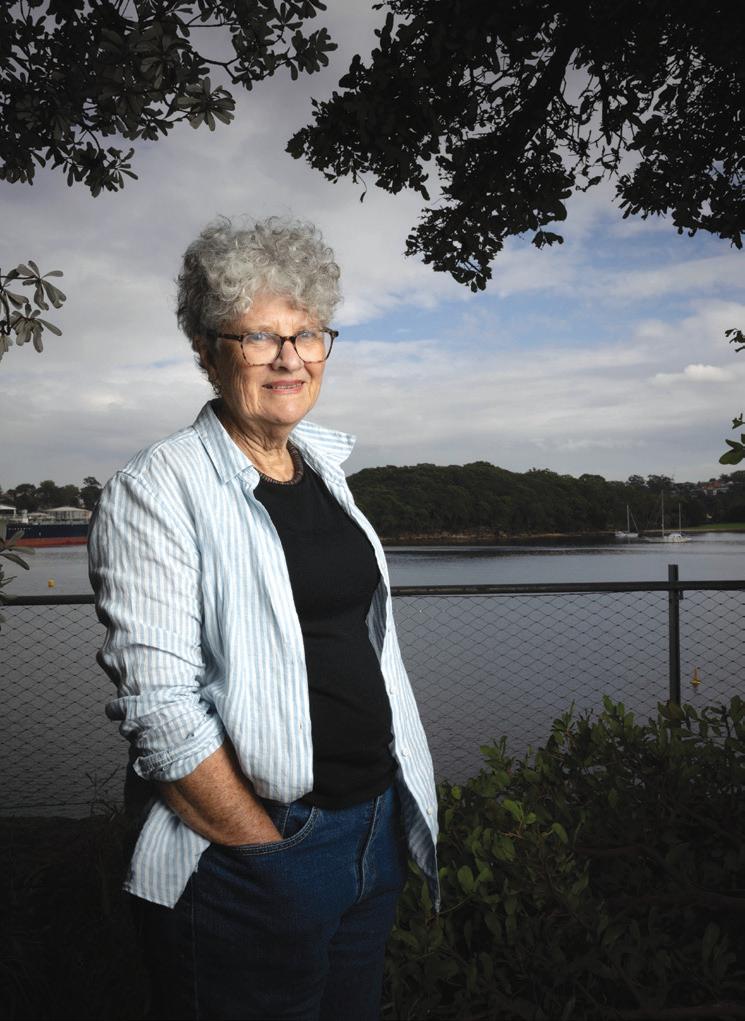
The latest issue of IE is packaged with this edition of Newsmonth. Remember, reading IE can count towards your PD.

In this edition, award-winning author Kate Grenville discusses her latest book, Unsettled: A journey through time and place. Comedian and radio presenter Sammy J talks about the importance and joy of singing in school classrooms.
We discuss measures to address bullying in schools and why it is a serious health and safety issue for school staff as well as students.
New research on time poverty shows the importance of reducing teacher workloads to sustainable levels. We hope you enjoy this edition of IE and find it valuable for your professional practice. Your professional journal

If you’re an early childhood education and care member, you will receive the latest edition of Bedrock with this copy of Newsmonth.
We consider proposals to address the child safety crisis in the sector, which must include a properly paid workforce with good conditions. The IEU is at the forefront of pushing for carefully considered solutions that put children before profit.
New research finds a strong link between better workforce conditions and high-quality early childhood education – especially in communities where children stand to benefit most.
Discover how animals of all shapes and sizes can help to teach children empathy, responsibility and a deeper appreciation of the natural world.
We hope you enjoy this edition of Bedrock and find it valuable for your professional practice. Your early childhood education magazine Don’t miss
Every year, the IEU invites members from schools, colleges and early childhood centres to apply for grants to develop sustainability initiatives. This year 74 entries were received from across NSW and the ACT. The 2025 Environment grants, proudly sponsored by Teachers Mutual Bank and the IEU, have been announced, and include a variety of innovative and exciting projects.
Early Childhood Education and Care
Chrysalis Steiner Morning Star Kindergarten, Bellingen: Bringing in Bees and Building up our Food Forest
We will add native bee boxes and a frog pond, expand food production through herbs, vegetables and fruit trees, and strengthen our composting and worm farm systems to move towards zero waste. Children will actively engage in growing, harvesting and recycling, fostering environmental responsibility and a deep connection to nature.
Peter Pan Community Preschool, Wangi Wangi: Little Sprouts, Big Futures
The grant will enable the not-for-profit preschool to install composting stations,

recycled water tanks and a sensory garden into our nature-based play curriculum. Through guidance and intentionality, children will develop respect for nature, families will engage in experiences and take-home produce, and the community will benefit from a greener, more connected environment.
Primary schools
St Joseph’s Catholic Primary School, West Kempsey: Future Farmers Floodproof Garden
The project aims to rebuild the school garden to be flood-proof and productive by combining hydroponics with movable garden pods. This will allow students to compare plant growth in soil and hydroponic systems, deepening their understanding of plant needs, sustainability and innovative agriculture.
Catherine McAuley Catholic Primary School, Orange: Critters Cafe
The project aims to sustainably use the food waste that the school generates each week. Year 6 students will oversee and monitor the removal of food scraps from the playground
to the Critter Café worm farms. This, in turn, will enrich the soil and assist in the growing of produce.
St Joseph’s Primary School, Charlestown: Native Bees and Flower Corridor
The project aims to restore pollinator populations and strengthen biodiversity at the school following the varroa mite’s impact on Newcastle’s bee communities. Students will create native flowering corridors in garden beds and around an existing yarning circle, attracting both native and European bees. The addition of native stingless bee hives will provide hands-on learning about pollination, ecosystems and sustainability.
Secondary schools
Caroline Chisholm College, Glenmore Park: Ready, Set, Organise: Recycling, Composting
‘Ready, Set, Organise’ aims to increase composting and recycling throughout the school. The project aligns with the mission of the IEU’s environment grant by empowering students to steward better waste management practices.
Mount St Joseph Catholic College, Milperra: Let it Grow: MSJ Community Greenspace
The project aims to develop a series of green spaces (vertical garden/living wall, fresh produce garden and interactive Science/Technology teaching and learning garden) that will support student learning and connect the school with the local community. Student designs will be incorporated into the planning of these spaces.
Rosebank College, Five Dock: Nest and Seek
The project aims to support sustainability and biodiversity at the college by designing and 3D-printing bird boxes to be placed around the school grounds and fitted with wireless cameras to observe native wildlife. Students will engage in hands-on STEM learning through design, engineering and digital technologies to create functional habitats for native wildlife.
The IEU and Teachers Mutual Bank congratulate all grant winners, and we look forward to hearing more about their projects.
Richard Ryan Convenor, IEU Environment Committee

As a leader have you ever thought:
• I want to support my staff, but I don’t know what’s going on underneath.
• Why won’t they just do their job?
• I’m constantly putting out fires – I need strategies, not theory Why did that work for one teacher, but it didn’t work for another? I need practical ways to guide my staff, not micromanage. I want to grow as a leader, but I rarely get time to step back and reflect.
Presented by Michael Elphick and Associates (michaelelphick.com.au), this practical, two-day workshop is designed for middle and senior school leaders who would like to build stronger, more motivated teams.
Using Situational Leadership, Herzberg’s Motivation Theory and the DiSC behavioural model, this PD will help you better understand your team and yourself.
From coaching struggling teachers to lifting team morale, this program is for anyone managing the messy, human side of leadership.
You’ll walk away with clear, evidence-based frameworks to help you lead with empathy, manage different personalities, and respond constructively to burnout, resistance and change fatigue. If you lead people, this course is for you.
Who it’s for Principals
Assistant Principals
Year Coordinators and Middle Leaders
Lead Teachers and Stage Coordinators
• Staff managing teams, leading programs, or coaching colleagues
• Teachers with leadership potential or aspiring to leadership roles
“This course is engaging and practical – it gave me real tools I could use straight away. The sessions were engaging, highly relevant, and full of insights into how to lead people, not just manage them. This course will genuinely change how you lead your team.”
Michelle Mella, IEU member, Presbyterian Ladies’ College, Croydon
Two-day course: When and where Tuesday 3 March 2026, 9am to 4pm IEU training room, Wattle Street, Ultimo Wednesday 4 March 2026, 9am to 4pm IEU training room, Wattle Street, Ultimo
Cost
$1150 members
$1350 non-members
This course addresses the Australian Professional Standards for Teachers, Middle Leaders and Principals and provides 12 hours of professional development for teachers maintaining accreditation at proficient, highly accomplished or lead.
More details and register: www.ieu.asn.au/events
Login to register and the IEU will invoice you or your school.
The union’s Annual General Meeting on 25 October heard from several speakers. Here are highlights from four of them.
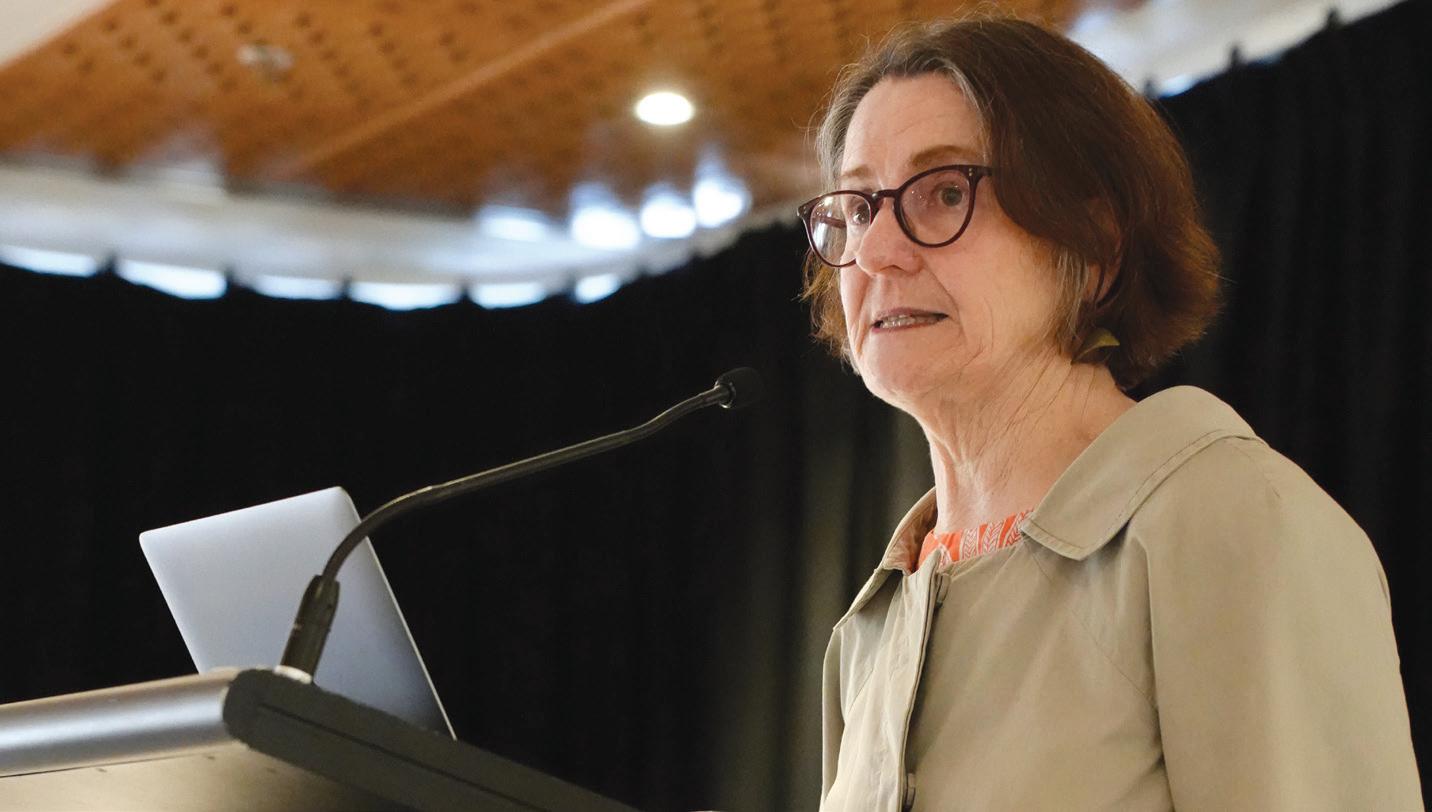
It’s been a year of major gains for members –both industrially and politically.
About 20,000 members in Catholic systemic schools are set to vote on new EAs – while pay rises were settled late last year, negotiations continued for months on the union’s claim for improved conditions (see pages 1 and 3).
Thanks to our reps and members in independent schools – your campaign was historic and made the union highly visible.
The results were outstanding, with pay increases of up to $20,000 for some teachers, while many received $12,000, and support staff also saw significant rises.
We’re working with teacher aides in Aspect schools and expanding our membership there (see page 4).
More than 1500 preschool teacher members, supporters, parents and the community rallied for pay rises in Sydney, with strong turnouts also in Lismore and Coffs Harbour (see pages 1, 8).
It was absolutely electrifying – and turning out in those numbers has real consequences.
After two years of tough negotiations, we’ve secured an agreement with 38 Christian schools in NSW (see page 3).
And we’re in discussions with the Diocese of Lismore about staffing changes – we’re monitoring that closely.
Proposed changes to workers compensation could limit support for workers experiencing psychological injury. Labor’s plan is to cut off access after a certain period if you do not meet an impairment threshold.
I would like to thank all IEU staff for their hard work and professionalism. I thank the full-time leadership team – Deputy Secretary David Towson and Assistant Secretaries Lyn Caton and Amanda Hioe – for their support.
I also wish to thank Helen O’Regan who plays an invaluable role in supporting me in my role as Secretary. Together we make a great team.
NSW Anti-Slavery Commissioner
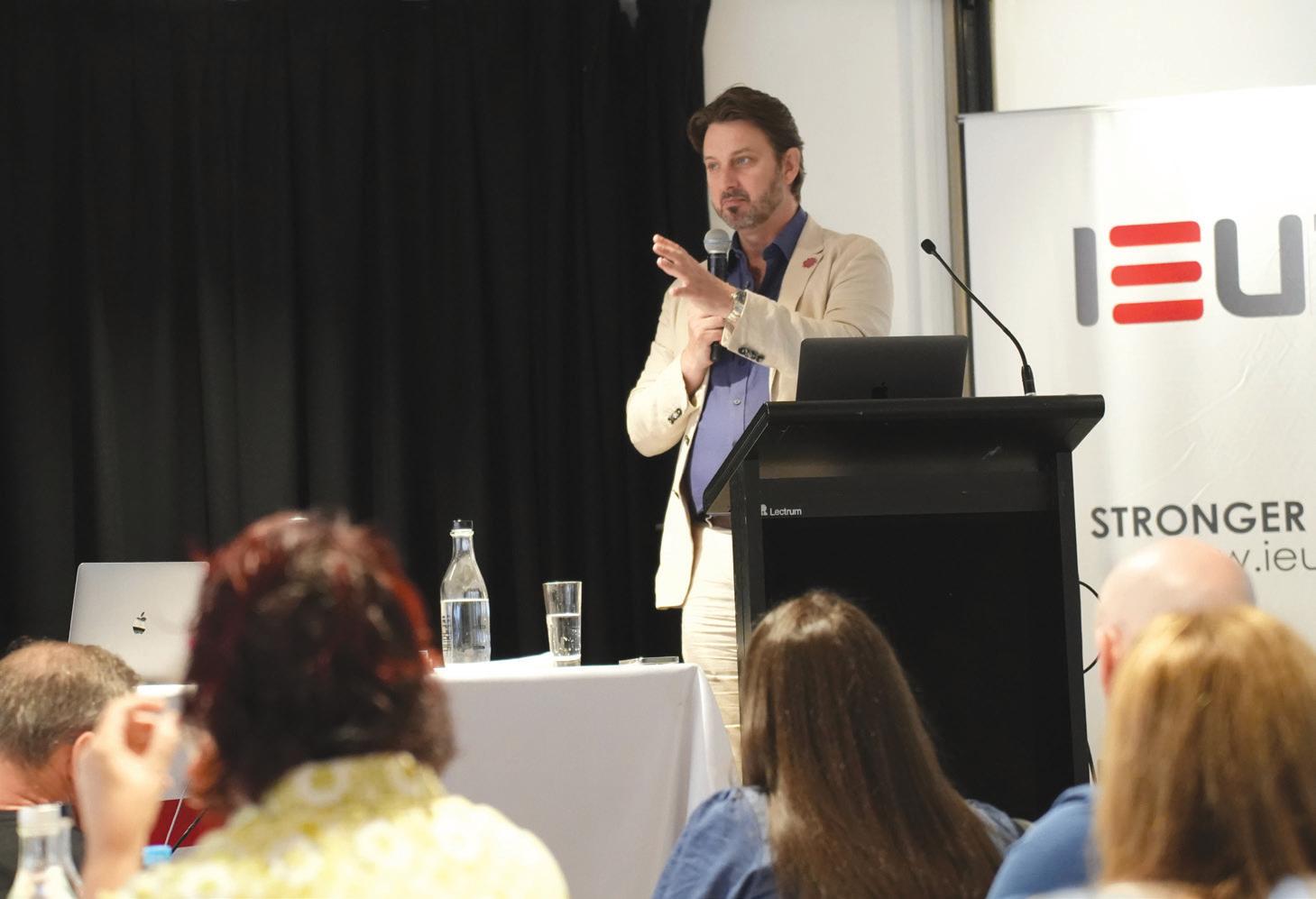
Anti-slavery is core union business. It’s about protecting vulnerable workers.
First Nations peoples all around the state are survivors of practices that, if they happened today, would constitute modern slavery under the law.
Anti-slavery is also core educators’ business. It’s about looking for vulnerable people and protecting them through our contact with them in educational institutions, and educating children so they’re not going to behave in a way that exploits others in the future.
A recent example is the NSW government’s decision to bring 600 school cleaners back in-house, aimed at reducing the risk of modern slavery. Cleaners are among the most vulnerable workers, especially when employed by labourhire firms that exploit their circumstances.
Glenn Lowe Outgoing IEU
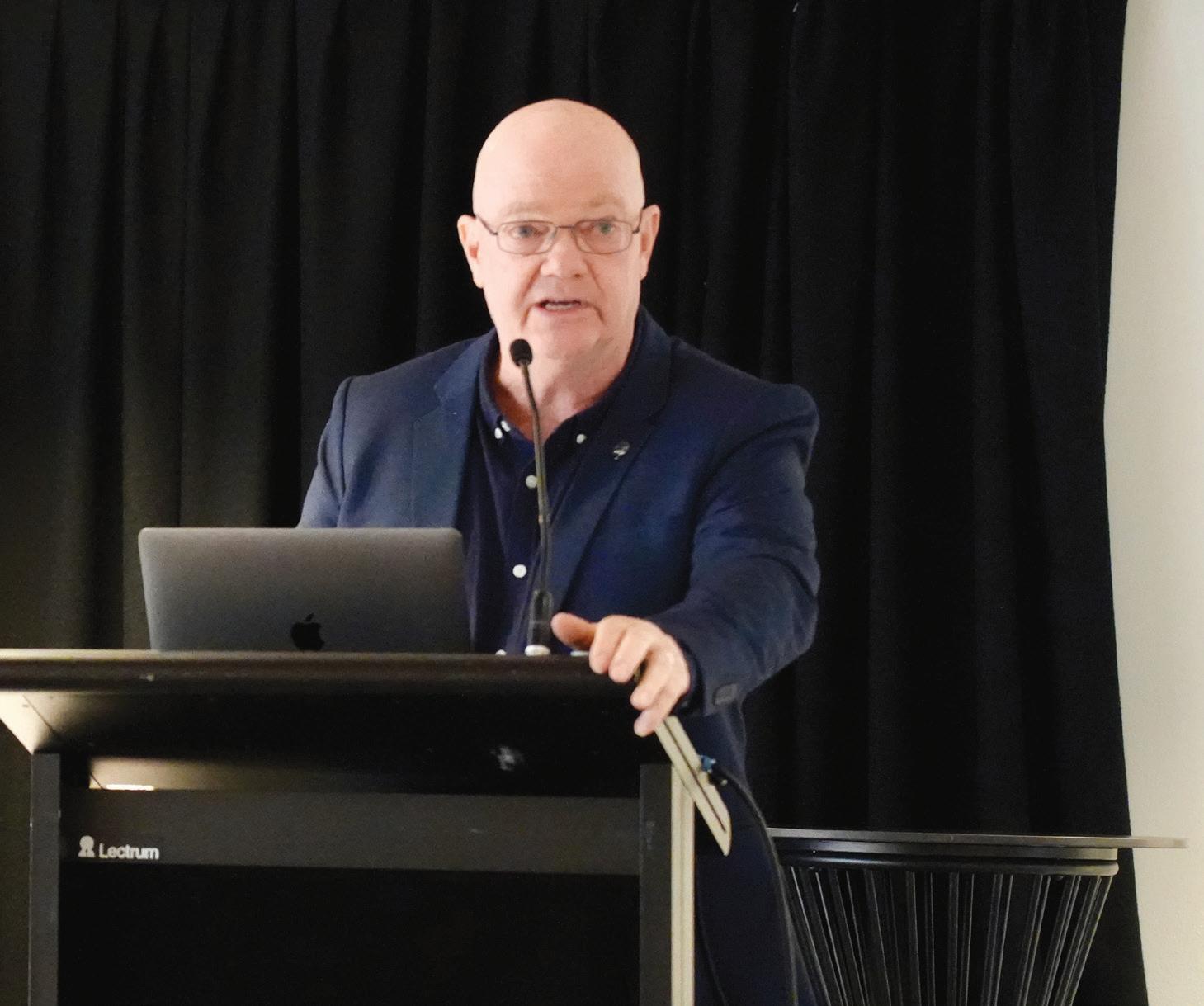
Today brings mixed emotions. I feel enormous pride and deep honour in having had the opportunity to serve the IEU, yet this is accompanied by a sense of loss as my term as President comes to an end.
Together, we’ve strengthened our collective voice, defended the rights of members and secured meaningful gains. Our shared action continues to shape fairer workplaces and build a stronger future for all educators and the communities we serve.
I express my immense gratitude for the trust and solidarity that you – the IEU leaders and members – have shown in me. The strength of the IEU lies in our collective commitment to fairness, respect and justice. When educators and their unions stand up for justice and fight against authoritarian attitudes, they not only protect their profession, they model courage, compassion and integrity for the next generation. In doing so we don’t just create better schools, we create a better world.

Chrissy Lynch
President of the Massachusetts Chapter of the American Federation of Labor and Congress of Industrial Organizations (AFL-CIO).
The Chapter represents about 500,000 workers from 800 local unions across the state.
Modern slavery offences in NSW include forced labour, debt bondage, deceptive recruiting, sexual servitude, child exploitation offences and organ trafficking. Teachers may encounter signs of forced marriage or exit trafficking, such as students leaving school early or being taken overseas on a family holiday and not returning.
There’s a role for unions to think about how we can help extend safeguards to vulnerable workers.
More information
NSW Anti-Slavery Commissioner: dcj.nsw.gov. au/legal-and-justice/our-commissioners/antislavery-commissioner.html Forced marriage: mybluesky.org.au
Just two years ago in America, we had what we call the best president for the labour movement in our history.
We had hoped we were about to elect the first woman President of the United States.
But when election day came, working class people saw an out-of-touch Democratic Party.
We went around saying Biden was the best president for workers in history. And workers were like, “Really? Because I can’t afford rent, I can’t find a place to send my kid for preschool. I can’t find a place to send my ageing parent. Everything costs too much, and everything is out of reach.”
They saw a populist-sounding Republican Party that offered convenient excuses for why working people were hurting.
We’re working with allied groups – we may not agree on everything – but we’re stronger
when we’re working together, trying to reject the false choices the corporate class always pushes on us.
I think some of the false choices we’re dealing with are similar to yours. We know we can demand both ample, affordable housing and family-sustaining wages for workers, right?
And we can embrace the good and transformative parts of artificial intelligence, but only if we do so clear-eyed and determined to mitigate the transformative risks.
I am proud to represent about 150,000 educators. I am also the proud parent of two kids in our schools. The working conditions of our educators are the learning conditions of my kids. I want to thank you for what you do to educate the next generation, while also fighting for an economy that might actually work for them once they get into the workforce.




In Term 3, the union launched a competition to find the best IEU noticeboards across NSW and the ACT.
“The noticeboard is a vital tool for building union presence and solidarity at your workplace,” said IEUA NSW/ACT Branch Secretary Carol Matthews. “The competition was a great opportunity for reps to update their boards and strengthen their chapters.”
Competition was fierce, and we received many fantastic entries. Ultimately, three noticeboards emerged as the winners. These entries were creative and captured the spirit of our IEU membership.
The winners of the 2025 IEU Union Noticeboard competition are:
St John the Apostle Primary School, Florey, submitted by Kate MacDonald
St Joseph’s Primary School, Port Macquarie, submitted by Tracy Bancroft
St Paul’s Catholic College, Manly, submitted by Kate Murphy.
Thank you to everyone who submitted a board. Visit our website for a gallery of submissions – we hope they inspire you for next year’s competition.








Delivering quality early childhood education has always been “the most important job” for this preschool director, writes Tania Yardley.
An after-school cleaning job in a preschool inspired Bridget Isichei to pursue a degree in early childhood teaching.
“Even when I was quite young, I always had this feeling it was the most important job that could be done,” she said. “You can make a big impact.”
Bridget has had a varied career as a teacher in preschools in Australia, New Zealand, Britain and Thailand.
For two years she also trained early childhood teachers in Vanuatu and encouraged them to enrol in courses offered by the University of Fiji.
“In Vanuatu, people speak to their ancestors, the place that you’re from has a spirit, the land has the spirit, and you are part of that,” Bridget said.
“They have this incredible resilience and determination, because they have all these layers of understanding.”
Bridget is now the director of Byron Bay Preschool, managing three centres catering to children aged three-to-five.
“Community preschools are the most successful model in NSW,” Bridget said. “Most of the community preschools are in regional areas, and they’re doing a fantastic job.”
However, high-quality community preschools face an ongoing workforce crisis.
Preschool teachers earn up to 30 per cent less than their counterparts in schools but the NSW government is refusing to fund pay increases (see Day of action, pages 1 and 8).
This has fuelled a staffing crisis, with Byron Bay Preschool losing six staff members in the last year.
Bridget said staff had departed for other states or sectors that are better paid. In addition, she receives fewer applications for jobs than in the past.
Bridget’s passion for the sector prompted her to join the IEU after talking to a colleague from the Northern Rivers Preschool Alliance where she serves as president.
“I just thought, this is where I need to be,” Bridget said. “These are the people who are fighting for our rights.”
Passionate advocate
An IEU member since March 2024, Bridget is an ambassador for the Start Strong, Pay Fair campaign, lobbying MPs and appearing at the Fair Work Commission in support of lifting pay and conditions for teachers and educators in community preschools.
With a shortage of teachers and educators in NSW, and pay rises in other sectors, community preschools are struggling.
“We said to them, ‘It’s not rocket science’,” Bridget said. “Everybody else has achieved wage increases, the one sector that hasn’t is going to collapse.”
Unfortunately, the NSW government has so far ignored requests to provide funding to lift pay and conditions.
“I think it’s a time now for the community and the government to be really brave – start putting quality first,” Bridget said.
Quality education matters
Bridget’s fight for better pay and conditions is ultimately about providing the highest quality education for young children.
Research shows quality early childhood education changes lives, especially for children from vulnerable backgrounds.
“We can actually send them on a different trajectory for the rest of their life,” Bridget said.
The lack of government funding is something she sees as “risking the education of the 45,000 children that are in community preschools”.
“Without that attachment, no other development can happen,” Bridget said. “We need to make sure that children are seeing the same educators every time they come in.”
Lisa Eaton’s innovative teaching equips her students with valuable life skills, writes Andrew Taylor.
From whale watching at Nobbys Beach to shopping at Vinnie’s and ordering in cafes, Lisa Eaton’s lessons extend beyond the classroom to encompass all of Newcastle.
A Special Education teacher at St Dominic’s Catholic College in Mayfield, Lisa teaches the Life Skills syllabus, which includes a community access program for students to experience new places and scenarios around the city.
“I love being able to adjust the content of the Life Skills syllabus to really cater to the needs and interests of each student as an individual,” she said.
Classes at St Dominic’s, a K-12 school for students with additional needs, are small, which Lisa said provided staff with the capacity “to really spend quality teaching time with each student”.
Lisa’s determination to give students the best start in life also prompted her to set up the Cafe Club and Canteen programs at the school with the backing of her colleagues.
“Within the programs we have been able to create roles in finance, cooking, barista skills, customer service and shopping,” she said.
“At the end of the day, we want students to learn skills they can apply outside of school and set them up with the best opportunities to transition successfully to post-school options and/or gain meaningful employment.”
Promote social inclusion
Lisa’s efforts won her the Innovation Award at this year’s Catholic Diocese of Maitland-Newcastle’s Emmaus Awards.
The awards’ judges said Lisa had shown outstanding innovation in managing the Life Skills Program at St Dominic’s, particularly through initiatives such as the Cafe Club and Canteen programs.
“These initiatives enhance their food technology knowledge and promote social inclusion and personal growth,” the judges said.
The judges also praised the Work in Communities and
Community Access Programs, which they said, “encouraged greater collaboration among staff, students and the local community, reinforcing the school’s commitment to inclusivity”.
Lisa said she was driven to “think outside the square” to ensure her students learn skills for life beyond school.
“Being innovative often stems from a desire to reignite the spark within ourselves as teachers,” she said. “Trying new things, manipulating content and making lessons more engaging all make teaching more exciting too.”
Achieve pay increases
An IEU member since 2022, Lisa joined the union after talking to a rep who explained how the union assisted members.
“I have seen the union take action to help us achieve pay increases and reduce teacher workload,” she said.
“I have seen how the union has supported staff to know their rights and provided backing when needed.”
“We know that if we have questions, we can speak with our union rep and our questions will be answered and support provided. Without the union we would be left unsupported.”
A teacher for almost 15 years, Lisa said retaining patience and creativity for her own children was a challenge.
“Over their career, teachers develop an extraordinary ability to stay calm in the face of all sorts of challenges,” she said.
“Some days you just want to go home and tune out from the world, but being a parent myself, my own children then need my attention and time. Practising self-care is certainly high on the priority list.”
Despite these challenges, Lisa said there were many rewarding aspects of teaching.
“I have a genuine love for my students, seeing them achieve, teaching them how to take on challenges and advocate for themselves, watching them graduate into postschool options,” she said.
“And the daily banter and laughs within the classroom are second to none.”

3 | 2025
The IEU has 19 geographical sub branches across NSW and the ACT, plus the Principals’ Sub Branch. Sub branches meet four times a year, usually in the first three or four weeks of each term.
Sub branch meetings are a way for reps and members to provide feedback to the union about what’s happening on the ground in their workplaces. The meetings are also an opportunity for reps and members from each region to hear updates from IEU organisers.
Each sub branch sends four to six delegates to quarterly IEU Council meetings. Council is the union’s decision-making body, bringing together about 115 member delegates from throughout NSW and the ACT.
The IEU Executive of 22 members is elected every three years by members.
All reps and any IEU members who would like to develop their union activism are warmly invited to attend their region’s sub branch meeting.
Contact your rep or organiser if you would like more information.
Central Coast
The Central Coast Sub Branch includes Gosford, Erina, Green Point, Lake Munmorah, Tuggerah, Wyong and surrounds.
The Central Coast Sub Branch met on 31 July at the Ourimbah RSL, on Darkinjung Land. We addressed the formal agenda, followed by issues in schools, offering a chance for members to raise issues and concerns that are not always on the IEU radar. Issues discussed included:
• Catholic sector: coordinator contracts, temporary contracts, sexual harassment policies and procedures, and pay rates for additional days to a contracted part time role
Seventh-day Adventist sector: the ‘effectiveness’ of five PD days rolled into one week during a three-week mid-year break
Independent sector: new school leadership was the main topic for discussion.
Members also reported on positive aspects of working at their schools. Comments such as “We have our issues, but the principal and colleagues are supportive and it’s still a good place to work”, were common.
There was particular interest in the case of a Queensland teacher sacked for yelling at students. The Fair Work Commissioner hearing the case said, “I consider it absurd to suggest that a high school teacher can be found to have committed serious misconduct simply because they have raised their voice towards misbehaving students.”
While there were complexities to this matter, members were reassured by the comments.
Jim Hall Organiser
Central Metropolitan
The Central Metropolitan Sub Branch includes central Sydney, Sydney’s inner-western suburbs, Rhodes, Concord and Meadowbank.
Central Metropolitan representatives attended the Term 3 sub branch meeting at Burwood RSL Club on 12 August.
One of the first topics discussed was the recent IEU win in the Fair Work Commission regarding the new entitlement in the independent schools’ multi-enterprise agreement allowing a non-initial primary caregiver to take 12 weeks of paid parental leave.
There was also an update on the Catholic systemic EA and WPAs, along with discussion of AIS matters, particularly the workload transparency clause in the new independent school teachers’ MEA. This clause requires schools to inform teachers of workload expectations, including any reduction in face-to-face hours for Leadership Level 1 and 2 positions, and to publish this information in school policies.
The meeting also addressed after-hours expectations, noting reliance on volunteers and limited notice. Members discussed strategies to boost transparency, such as upskilling colleagues to confidently decline when “volunteered” and encouraging collective action to ensure events are clearly scheduled.
It was great to meet in person after Term 2’s Zoom meeting, and the relaxed post-meeting dinner was a success.
Our Term 4 meeting will combine with the Metropolitan East Sub Branch at the IEU office in Ultimo.
Michelle Mella Sub Branch President
Central West
The Central West Sub Branch includes Dubbo, Bathurst, Orange and Lithgow, as well as Cowra, Mudgee, Parkes, Forbes, Grenfell and Wilcannia. Representatives from the Central West Sub Branch met at Dubbo RSL on 15 August. In addition to the general agenda items, attendees were highly engaged with issues arising for members working in schools run by Catholic Education Diocese of Bathurst (CEDB).
Late in Term 2, the diocese imposed a never-before-used clause of the Catholic systemic EA to deduct up to 10 days of long service leave (LSL) for the pupil vacation period (PVP) from teachers who applied to take short blocks of LSL adjacent to the June/July PVP (see page 5).
The union found that about one-quarter of the 40 teachers who took LSL adjacent to the PVP were affected by the clause’s provisions.
While we accept the EA allows this to occur, members were rightly concerned about the timing of the action. Affected teachers had applied for their LSL with six-to-nine months’ notice (and had approval from their principal and CEDB), but were only advised of the decision to impose this provision a few days prior to commencing their leave.
Attempts to clarify the criteria used to determine who was subject to the deduction were unsuccessful. The union expressed concerns at the inference it was imposed on teachers who were unavailable to be recalled to school during the PVP due to being overseas or interstate.
The union continues to seek a reversal of the decision arguing that: the decision to deduct PVP as LSL should have been made at the time the teacher applied for leave clear criteria for the deduction must be available before leave applications are made.
To date, the union has sought a formal response from CEDB regarding its concerns and continues to explore options to reverse the deduction applied to those whose leave had already been approved.
Donna Widdison Organiser
Cumberland
The Cumberland Sub Branch includes Parramatta, Mt Druitt, Castle Hill, Marsden Park, Blacktown and nearby surrounds.
The Cumberland Sub Branch meeting was held on 28 July at the IEU office in Parramatta, with a focus on managing workloads in schools.
Reps reviewed NESA factsheets on compliance, programming and record keeping, as well as the Department of Education’s NCCD factsheet. We discussed sample work practices agreements and psychosocial safety. Reps from different sectors, including Catholic systemic, Catholic independent, and independent schools shared feedback on current practices related to each topic, fostering valuable collaboration. They provided examples from their workplaces illustrating how NESA and NCCD compliance is being implemented.
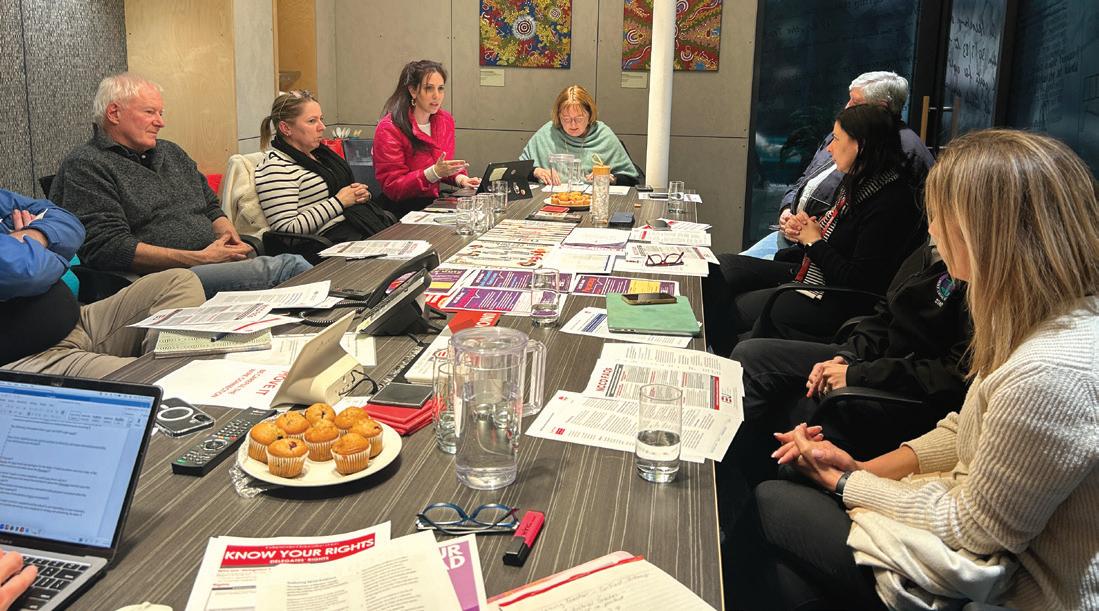
Reps were asked to assess how their practices align with requirements in the factsheets to ensure teachers and operational staff are not engaging in unnecessary work.
All reps are encouraged to attend future meetings, or send an observer in their place, to ensure continued engagement and representation.
Lubna Haddad Organiser
Hunter Valley
The Hunter Valley Sub Branch includes Newcastle, Maitland, Singleton, Scone, Taree and surrounds.
The Term 3 meeting, held at the Blackbutt Hotel in Lambton, was well attended, with 32 reps and members from across the region. We had a productive discussion on teacher workload and working conditions.
Performance and development processes and goal setting: Members voiced concerns about the lack of authenticity and meaningful engagement, with goal setting often feeling like a box-ticking exercise.
Case management meetings: Often used by schools to collect evidence, make decisions about levels of adjustment, and demonstrate collaboration. While considered good practice, they are not mandated by the NCCD guidelines. Teachers are routinely asked to participate without being allocated time to do so.
Learning support teacher workloads and timetabling: Concerns were raised about increasing demands and inadequate time allocations.
Professional development: The expectation for staff to complete professional learning in their own time was challenged, with calls for a more sustainable and respectful approach.
Teacher librarians: Members reported that teacher librarians have been directed to teach subjects outside their trained areas, raising concerns about role allocation and professional recognition.
Sports coordination in primary schools: Members noted the increasing burden of coordinating school sport without adequate release time. School safety and codes of conduct: Members raised safety concerns, particularly the need for secure entry points and stronger codes of conduct for parents and community members.
The strong turnout and active participation reflect members’ continued commitment to advocating for fair and sustainable conditions within our schools. Organisers will follow up and provide updates.
Raelene Maxworthy Organiser
Ku-ring-gai
The Ku-ring-gai Sub Branch covers Sydney’s north shore, including Hornsby, Wahroonga, Waitara, Warrawee, Thornleigh, Pymble, Turramurra, Berowra and Asquith.
The Sub Branch meets in the bistro at Hornsby RSL on the third Monday of each school term. At our Term 3 meeting, IEU Deputy Secretary David Towson and organiser Charles Wheeler were joined by teachers and support staff from a mix of schools and sectors.
Attendees reported on local professional and industrial issues in their school and sector. It was a great opportunity to hear from others and identify both differences and commonalities. Moreover, it provided a forum for union officials to listen and learn from members.
At half-time, we paused to order dinner and drinks, then commenced the second part of the meeting, when broader union matters were discussed. Topics included: Seventh-day Adventist bargaining; Catholic Schools Broken Bay pay rises; flexible work arrangements; workers compensation reforms; workload transparency progress; and anti-bullying consultation. It was a pleasure to report on the major union win in securing a new enterprise agreement (EA) and Work Practices framework for teachers and professional staff at NextSense School for children with hearing or vision loss.
Charles Wheeler Organiser
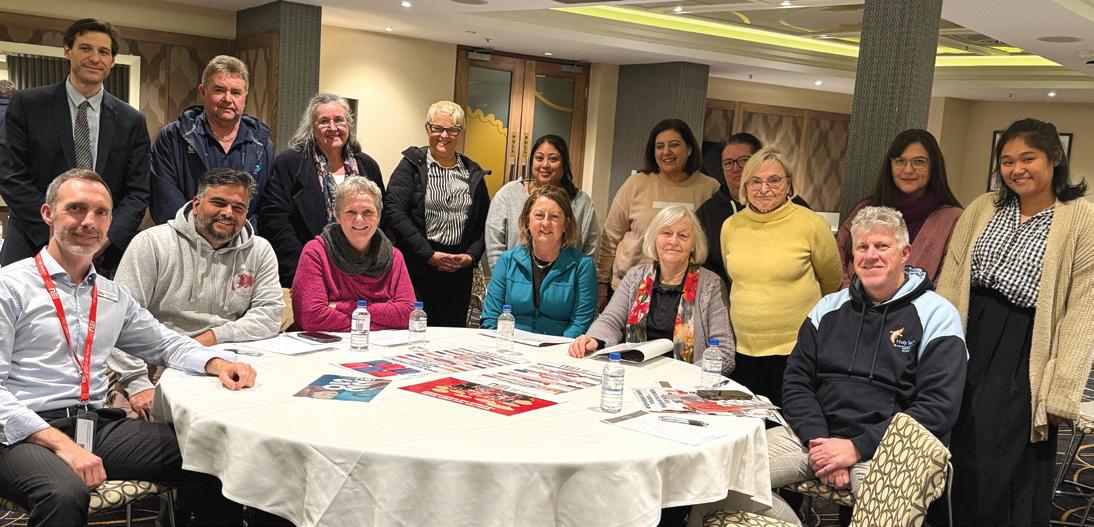
The Lansdowne Sub Branch includes Lakemba to Liverpool, as well as Bankstown, Fairfield and Auburn.
The Lansdowne Sub Branch met on 14 August at Fairfield RSL for its third gathering of the year. Fourteen reps and three IEU officials attended including Branch Secretary Carol Matthews. We welcomed several reps who were attending their first sub branch meeting.
The progress of bargaining in Catholic systemic schools was the major topic of discussion, with reps providing insights on the situation in their chapter and asking questions regarding proposed changes to the next EA.
IEU officers reported on the improvements to employee pay and conditions that have been agreed in principle with Catholic employers and further advised that a vote on the EA is likely to occur in Term 3 this year.
After the meeting, members enjoyed dinner together at an Italian restaurant. We warmly invite reps and members to join upcoming meetings.
Aidan Anderson Organiser
Metropolitan East
The Metropolitan East Sub Branch covers Sydney’s eastern suburbs, including Bondi, Waverley and Bellevue Hill.
The Sub Branch met at The Juniors Kingsford on 13 August. Members heard reports from officers on the upcoming Catholic systemic EA, developments in independent schools, and other union news, while also having a chance to discuss issues of interest occurring in their schools.
Catholic systemic primary school members raised a rising need for more funding and time to support an ever-increasing number of NCCD students.
In some Catholic systemic secondary schools, long parent/ teacher interview days are a concern, with some stretching from 8.30am to 7pm. The Sub Branch discussed the inherent WHS risks, fatigue, and the shift in custom and practice. Chapter action was recommended.
Members said they would welcome more information and fact sheets and posters for staffroom walls.
The Term 4 meeting will be combined with Central Metropolitan and held at the IEU office in Ultimo.
Kendall Warren Organiser

Mid North Coast
The Mid North Coast Sub Branch includes Coffs Harbour, Kempsey, Port Macquarie, Bellingen, Nambucca Heads and surrounds.
The Mid North Coast Sub Branch continues to play an active role in addressing workload challenges across the region.
At the meeting on 15 August, workload was the defining concern for the Catholic systemic and independent sectors, with members reporting increasing strain from administrative demands.
In the Catholic systemic sector, following a disappointing response from the employer during WPA negotiations, concerns around NCCD data practices have come into sharper focus.
Members shared experiences and are scrutinising the extent to which their responsibilities for data collection and reporting exceed the minimum requirements set by the federal Education Department. This heightened level of accountability has raised serious concerns about the sustainability of current approaches.
In the AIS sector, members showed strong interest in the newly introduced workload transparency clause.
There was a clear appetite for greater clarity and consistency in schools, including face-to-face teaching hours and extracurricular obligations. Members see transparency as a crucial step toward fairer and more sustainable workloads.
Despite the challenges, the Mid North Coast Sub Branch continues to meet them with resolve. Backed by an engaged and experienced membership, the Sub Branch remains committed to securing lasting improvements in workload conditions.
Sean van der Heide Organiser
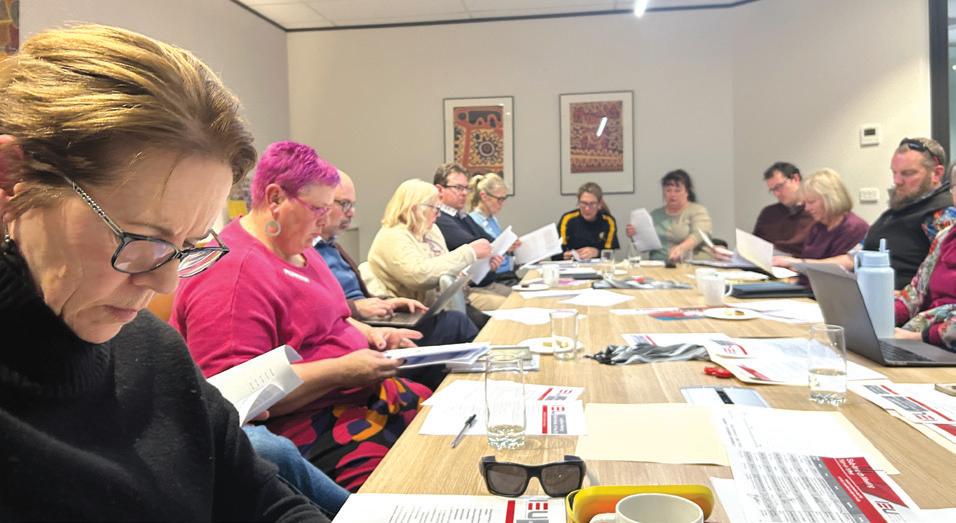
Other issues discussed included how representatives can support members in leadership positions, when out-of-hours events are considered excessive, and provisions for paternity leave.
Angela McDonald Organiser
North Coast
The North Coast Sub Branch covers Lismore, Tweed Heads, Kingscliff, Pottsville, Murwillumbah, Mullumbimby, Kyogle, Ballina, Lismore, Casino, Coraki, Woodburn, Yamba and Maclean.
The Term 3 meeting on 6 August was held at Brunswick Heads Hotel, with 13 members attending, along with IEU Assistant Secretary Lyn Caton, Industrial Officer Carolyn Moore, and Organiser Richard Ryan.
We discussed issues impacting teacher workload and working conditions in schools. Key matters included:
Overstaffing in schools and uncertainty about how that plays out
Flexible work arrangements
Funding cuts to support programs in some schools
• Larger class sizes and fewer teacher aides to assist
Part-time teachers feeling pressured to attend PD on non-work days
Reports of general staff meetings being used for PD and inservice events
Teacher aides being asked to attend twilight sessions.
The Sub Branch paid tribute to long-term IEU member, rep, and IEU Council delegate Mary Howard, who passed away recently.
Emily Webster was elected to fill the casual vacancy on Council, taking Mary’s position.
Richard Ryan Organiser

The North West Sub Branch covers the New England region including Armidale, Tamworth, Gunnedah, Tenterfield, Inverell, Moree and Narrabri.
At the end of a cold, wet week – with snowfall closing parts of the New England Highway – a gathering of seven brave souls took place at the Tamworth Hotel and a lively discussion ensued.
Our AIS delegates reported concerns about a new protocol for ‘signing in’ at Calrossy Anglican School and the implications of installing tracking apps on phones. The chapter will begin by raising this with their leadership.
In the week leading up to the meeting, chapters at Catholic systemic schools in Tenterfield, Glen Innes, Walcha, Armidale, Uralla, and Tamworth met. Members in these and other systemic schools will vote on their new EA and WPA in Term 4 (see pp 1, 3).
We raised a glass to Sharon Draper, long-term member, rep and Council delegate who officially retired from teaching.
It was also unanimously agreed that a shout-out to our IEU media and communications team was well deserved; with a bumper edition of Newsmonth adorning staffroom tables far and wide, featuring plenty of North West content (Note from the team: Thanks North West!).
Sue McKay Organiser
Northern Beaches
The Northern Beaches Sub Branch includes Manly, Dee Why, Collaroy, Narrabeen, Terrey Hills, Warriewood and surrounds.
The Northern Beaches Sub Branch met on 12 August at the Dee Why RSL Club.
The meeting focused on the closure of St Cecilia’s in Balgowlah, which came as a shock to all. The AIS workload transparency clause was also a topic of interest, with members sharing experiences of how it is being implemented in practice at their own schools.
These discussions highlighted both the challenges we face and the importance of collective action in addressing them. Members spoke with clarity and commitment, reinforcing our shared union values of fairness, solidarity, and standing up for one another.
Lee Cunningham Organiser
Northern Suburbs
The Northern Suburbs Sub Branch covers Cremorne, Artarmon, Chatswood, Gladesville, Gordon, Hunters Hill, Kirribilli, Lane Cove, Lindfield, Milsons Point, Mosman, North Sydney, Roseville, Ryde, St Ives, St Leonards, Willoughby and Woolwich.
We noted the importance of using the IEU pro forma letter to formally request this information from school leaders. Where this step has been taken, responses have varied but often revealed a narrow interpretation of the clause.
The meeting reaffirmed that the union fought hard for this clause and that its spirit must be defended at the school level. Reps and organisers are encouraged to work together to campaign for genuine transparency.
Workload clarity, alongside stronger dispute resolution mechanisms that empower the FWC to arbitrate, was identified as a key priority for the next bargaining round.
We also discussed strategies encourage more professional and operational staff to join the IEU, including informal social gatherings that foster connection with reps and organisers.
Finally, we agreed that sending the workload transparency letter collectively as a sub branch would help present a unified front to school leaders.
Caroline Brehaut Sub Branch President
Penrith/Blue Mountains
The Penrith/Blue Mountains Sub Branch covers Penrith to Glenbrook, Katoomba and Blackheath.
The August meeting, held at Nepean Rowing Club, had great attendance, and we welcomed IEU Secretary Carol Matthews to our meeting for the term.
The main issue still arising for independent schools is that employers are not disclosing workloads to staff, even though it is now a requirement of the MEA. As with the pay rises, this is being applied inconsistently across schools.
Members were updated on the progress of Catholic systemic EA negotiations, which are nearing completion with positive gains in pay rises and parental leave entitlements. Workload issues are being negotiated mainly through Work Practices Agreements (WPAs) at the diocesan level. The full extent of the changes has not yet been communicated to members. Once final drafting issues are resolved, a vote will be organised.
Discussion ensued about the increasing expectation for staff to use their personal mobile phones for school processes. This issue will be raised with CSPD by IEU organisers to seek a response.
CathWest McCarthy campus rep Dannielle Willoughby expressed interest in attending the August Council meeting as an observer. We welcome Danni as an observer for our wonderful Penrith/Blue Mountains Sub Branch.
I spoke about the upcoming IEU elections for Executive and reminded everyone to look out for ballot papers at the start of September, with voting to close in early October. I encouraged everyone to motivate their chapters to vote and have their say in who governs the union for the next three years.
Liz Heggart Sub Branch President
Principals
The Principals Sub Branch meeting held on 2 August at the IEU Ultimo office reflected the escalating challenges faced by Catholic systemic school principals across NSW and the ACT. The meeting acknowledged the resignation of Anthony Weir as Council delegate and endorsed Niamh Marzol as his replacement.
The Sub Branch endorsed a new meeting structure: a Saturday in-person/online hybrid AGM in Term 1, Zoom meetings on Monday evenings in Terms 2 and 3, and an in-person/online hybrid meeting for Term 4. This aims to ensure accessibility while minimising disruptions to leadership duties.
Key reports tabled included updates on Religious Education accreditation, EA negotiations, the Federal Principals Committee, and a Broken Bay salary review showing that principals there earn 5.3% more than those in other dioceses.
Diocesan updates painted a troubling picture of principal burnout, poor succession planning, and eroding trust in system leadership. Housing shortages in Wilcannia-Forbes, problematic IT transitions in Sydney and a controversial payroll restructure in Parramatta were among the critical issues raised.
There were repeated concerns about mandated professional development, survey fatigue and a lack of consultation on key decisions impacting leadership roles.
EA negotiation updates revealed progress on pay and leave matters, but concerns remain around access to child protection records, LSL flexibility, and support for casual principals.
The Sub Branch continues to advocate strongly for systemic improvements and equitable treatment of all school leaders.
Lyn Caton Assistant Secretary
Riverina
The Riverina Sub Branch covers Albury, Griffith, Hay, Leeton, Thurgoona, Wagga Wagga and West Wyalong.
On 15 August, Riverina reps came together at Quest Griffith for the Term 3 Sub Branch meeting.
independent, Catholic, and Christian schools attended the Term 3 Monaro meeting at the IEU office in Canberra.
Members heard updates on bargaining for Catholic systemic and Christian schools, including information about the sale of Brindabella Christian School.
Independent school members were reminded about the workload transparency clause now included in the new MEA.
Members Kate MacDonald and MJ Logan volunteered to represent teachers on the federal government’s Anti-Bullying Rapid Review Taskforce. Organisers Tahlia Bruce and Angela McDonald represented members at the Anti-Bullying Stakeholder Roundtable.
It was encouraging to see increased attendance at our recent Northern Suburbs Sub Branch meeting, reflecting strong engagement among IEU reps across the region.
We discussed a recent Fair Work Commission recommendation regarding paid parental leave for non-initial primary carers. Members shared the range of responses from AIS schools, commending those that have already agreed to follow the FWC recommendation. We affirmed the role of chapter motions in highlighting staff sentiments, raising internal awareness, and influencing school decision-making.
The workload transparency clause in the new independent schools MEA was another major focus. Members reported that while many schools claim compliance, in practice the required information is often not easily accessible or collated in one place.
With our President an apology, the meeting was chaired by new organiser Tahlia Bruce, who has stepped into the Riverina role following Anthony Telford’s departure. Organiser Angela McDonald also joined the meeting, while Jackie Groom is on leave.
A major focus of the evening was Catholic systemic schools, with members hearing the latest on the enterprise agreement. Progress was slowed by staffing changes in the Wagga diocese, but the agreement was voted on early in Term 4 (see pages 1, 3).
Despite the challenges of bargaining, there are some clear wins, including improved long service leave accruals for support staff, cultural leave and an extension of non-initial primary carer’s leave to 12 weeks. Concerns remain around teacher-directed time on pupilfree days, which is being imposed inconsistently across the sector.
Discussion turned to independent schools, where members shared experiences of workload transparency measures. At the school level, members raised issues such as support staff hours, payment for learning support officers on overnight excursions, and delays in accessing professional preparation time.
In general business, the IEU updated members on workers compensation reforms and national anti-bullying consultations, which sparked valuable discussion on digital safety, youth programs, and community-led initiatives.
The evening was a positive opportunity for members to reconnect face-to-face, share updates across schools, and strengthen links throughout the Riverina.
Tahlia Bruce Organiser
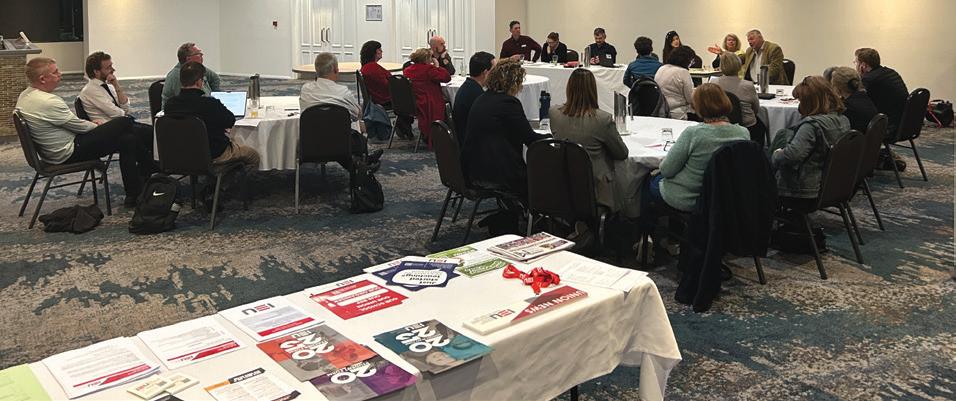
The South Coast Sub Branch covers the Macarthur region, the Southern Highlands, Wollongong and the Illawarra region and the northern end of the Shoalhaven region.
The Sub Branch met on 6 August at the Wollongong Golf Club. About 20 members attended, with reps from Catholic systemic, Catholic independent, independent and Christian schools.
Discussion focused on Catholic systemic EA negotiations, including consideration of the proposed Annexure K provisions for members employed in Catholic Education Diocese of Wollongong schools, which are not yet agreed upon.
The Sub Branch received an update from South Coast Labour Council Secretary Arthur Rorris on workers compensation changes and other issues affecting the region. Members were encouraged to remain engaged in campaigns to protect entitlements and workplace safety standards.
Independent school members discussed how the new transparency clause is being implemented in schools, noting differences in approach and communication across workplaces.
Workload concerns were also raised, particularly around attendance policy procedures and requirements. Members shared how these processes are impacting planning time, increasing administrative demands, and contributing to stress.
The meeting provided a valuable opportunity for members across all sectors to exchange views, identify shared challenges,
and consider strategies for addressing these issues collectively.
The next meeting will be held on 13 November at the Wollongong Golf Club.
Luke Breen Organiser
South East
The South East Sub Branch covers Yass, Young, Broulee, Bega, Goulburn, Tumut, Pambula, Googong, Batehaven, Cooma, Queanbeyan and Batlow.
Teachers and support staff from independent and Catholic schools attended the Term 3 meeting at the Statesman Hotel in Canberra on 1 August.
Members met new organiser Tahlia Bruce, who will be based in the Canberra office, supporting schools across the ACT and Riverina region. Deputy Secretary David Towson also attended.
There was robust discussion around role descriptions and duties for support staff; religion programming requirements and implementation; Religious Education accreditation; 30-minute uninterrupted breaks that are not occurring due to timetabling issues; first aid duties; concerns with Catalyst; meeting requests during RFF; pupil-free days; and the loss of RFF and planning time, particularly affecting part-time staff.
The next meeting is scheduled for 28 November.
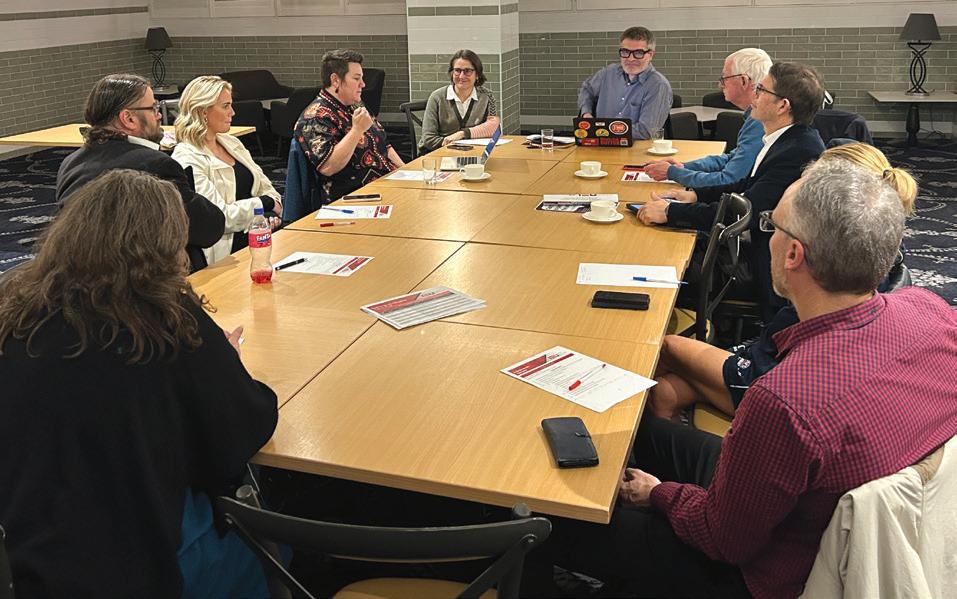
The Southern Suburbs Sub Branch covers the St George area and the Sutherland Shire.
There was increased attendance at the Term 3 meeting at Tradies Gymea, reflecting very welcome member engagement. We discussed the Catholic systemic negotiations with the enterprise agreement, Work Practices Agreements (WPAs) and annexures nearing finalisation at the time (see pages 1, 3).

Members were informed that once the EA is finalised, support staff should receive their 3% pay increase with back pay effective from 1 July, with teacher salaries to increase in October.
The extension of parental leave provisions will allow non-initial primary carers up to 24 months of leave if their partner gives birth after the agreement begins.
Member of the IEU Executive Amy Kermode summarised the Sydney Catholic Schools (SCS) workload reduction workshop and concerns raised by teacher representatives, including the need for in-lieu time for extracurricular activities, improved communication about the curriculum and the growing burden of data collection.
Employment practices were clarified: teachers are employed by SCS but attached to schools, and SCS must assist in redeployment if a school lacks available work. Temporary staff should generally be made permanent after two years, though parental leave coverage may complicate this.
Concerns persist around NCCD paperwork, with insufficient support for teachers of diverse learners and delays in diagnosis and funding – particularly in Year 7, a factor also affecting AIS schools. A shift from Google to Microsoft software has been strongly rumoured, raising questions about implementation.
Workload transparency clauses are unresolved at Shire Christian School and Inaburra School. The union is collating examples and hopes to provide guidelines on these clauses.
Reduction of 1.0 FTE to part-time work through negotiation (outside of a flexible working arrangement) needs to be handled carefully. Written clarification regarding a return to 1.0 FTE should be sought to safeguard both future full-time employment and long service leave entitlements.
Josef Dabbs Organiser


As a mutual bank, we have a different structure to Australia’s major banks. We are 100% owned by our members, meaning instead of profits being distributed to shareholders and investors through dividends, our profits are reinvested to benefit our members and communities. We focus on people, planet and profit, aiming to deliver the best outcomes for customers.
10-year record of recognition
Since 2014, Teachers Mutual Bank Limited has received external recognition for our sustainability and ESG performance more than 60 times, highlighting our long-term commitment to socially responsible banking.
Our bank has been proactively embedding sustainability into our core business, long before it became commonplace in the Australian finance sector. Our approach is built on independent certifications and assessments, including: we are only one of 58 banks in the world to be a Certified B Corporation
awarded the 2024 Banksia Foundation Large Business Sustainable Leadership Award recognised four years in a row (2021 – 2024) as a Responsible Investment Leader by the Responsible Investment Association Australasia.
Our contribution towards reconciliation
We are committed to reconciliation and aim to be an active participant in Australia’s reconciliation journey. Our vision is for reconciliation to be embedded within our bank, informing the way we work and interact with each other, our members and the wider community. We want to have a meaningful impact by establishing and strengthening mutually beneficial relationships with Aboriginal and Torres Strait Islander peoples and organisations.
Our B Corp certification and performance
We are one of only 58 banks in the world to be a Certified B Corp, meaning we are part of the global movement for an inclusive, equitable, and regenerative economy.
Our bank and climate change
For more than a decade we have proactively taken action on sustainability and climate across our property assets, investment policies, people engagement and advocacy. We know there is more to do. Our purpose is clear: banking for good, for those who do good.
Find out more here tmbl.com.au/banking-for-good
Important Information
Membership eligibility applies to join the Bank. Teachers Mutual Bank is a division of Teachers Mutual Bank Limited ABN 30 087 650 459 AFSL/Australian Credit Licence 238981. 58 is correct as of 28 January 2025. Deposit Bank – Developed Capital Markets as defined on bcorporation. ne Teachers Mutual Bank Limited – Reconciliation Action Plan Teachers Mutual Bank Limited Banking for Good Report March 2025

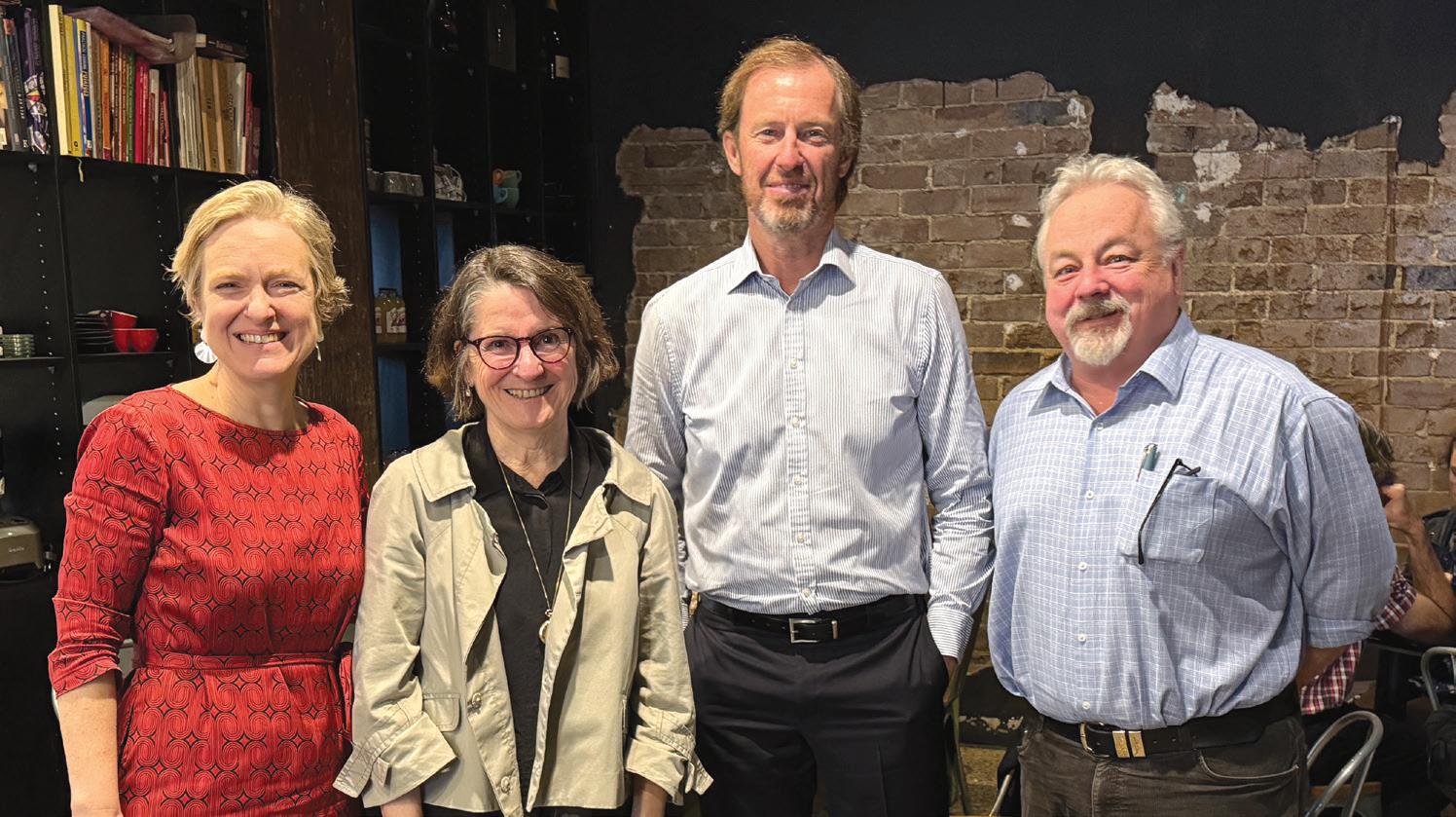
Secretary Carol Matthews Eora Nation
Deputy Secretary David Towson Eora Nation
Assistant Secretary Lyn Caton Dharug Nation
Assistant Secretary Amanda Hioe Eora Nation
President Suzanne Penson
MacKillop College, Port Macquarie Birpai Nation
Deputy President Vacant
Vice President Systemic Liz Heggart
Penola Catholic College, Emu Plains Dharug Nation
Vice President Non Systemic
Helen Templeton
St Scholastica’s College, Glebe Eora Nation
Vice President Support Staff
Nicole Downey
St Mary’s Catholic Primary School, Orange Wiradjuri Nation
Vice President Early Childhood Services
Vacant
Vice President ACT
David Caton Daramalan College, Dickson Ngunnawal People
Financial Officer
Denise McHugh NESA Liaison Officer
Kamilaroi Nation
Financial Officer Vacant
General Executive Members
Caroline Brehaut Redlands, Cremorne
Cammeraygal People
Sarah Gardiner
Catherine McAuley Catholic College, Medowie Worimi Nation
Amy Kermode
Mount St Joseph Catholic College, Milperra Eora Nation
Michelle Mella
Presbyterian Ladies’ College, Croydon Eora Nation
Peter Moore Our Lady of Mercy College, Burraneer Tharawal Nation
Christine Wilkinson
St Joseph’s Catholic College, East Gosford Darkinjung Nation
Amanda Wood
St Patrick’s Primary School, Wallsend Awabakal Nation
3 vacancies

Parramatta:
Newcastle: 8-14 Telford Street, Newcastle East NSW 2302 P 4926 9400
Wollongong: 1 Lowden Square, Wollongong NSW 2500 P 8202 8900
Lismore:

Author: Sean Scalmer
Publisher: Melbourne University Press
The length of the working day and the challenges of work-life balance are pressing issues for many Australians, as well as lively matters of public controversy.
While the eight-hour day is celebrated as a past industrial achievement, contemporary discussions of working hours often overlook its rich history.
Scalmer’s book affords us a way to understand the past so we can win back our time, collectively.


Author: Liane Moriarty
Publisher: Pan Macmillan
If you knew when you were going to die, what would you do differently?
It all begins on a flight from Hobart to Sydney. The flight will be smooth. It will land safely. Everyone who gets on the plane will get off the plane.
But almost all of them will be changed forever.
Liane Moriarty’s Here one moment looks at free will and destiny, grief and love, and the endless struggle to maintain certainty and control in an uncertain world.
Author: Hazel Flynn
Publisher: Piccolo Nero
Why are 1000 trees needed for every koala in a zoo? How do you check a tree-kangaroo’s pouch for joeys? Why is a wombat’s poo square-shaped? And how do dogs help look after ‘extinct’ bandicoots?
In Ninja bandicoots and turbo-charged wombats, real zookeepers share their funny and moving adventures, from looking after an orphaned koala to saving tiny frogs from extinction.
To go in the draw, email entries to giveaways@ieu.asn.au with the title of the book you would like to receive in the subject line. Write your name, membership number and postal address in the body of your email. All entries must be received by Thursday 4 December 2025.

